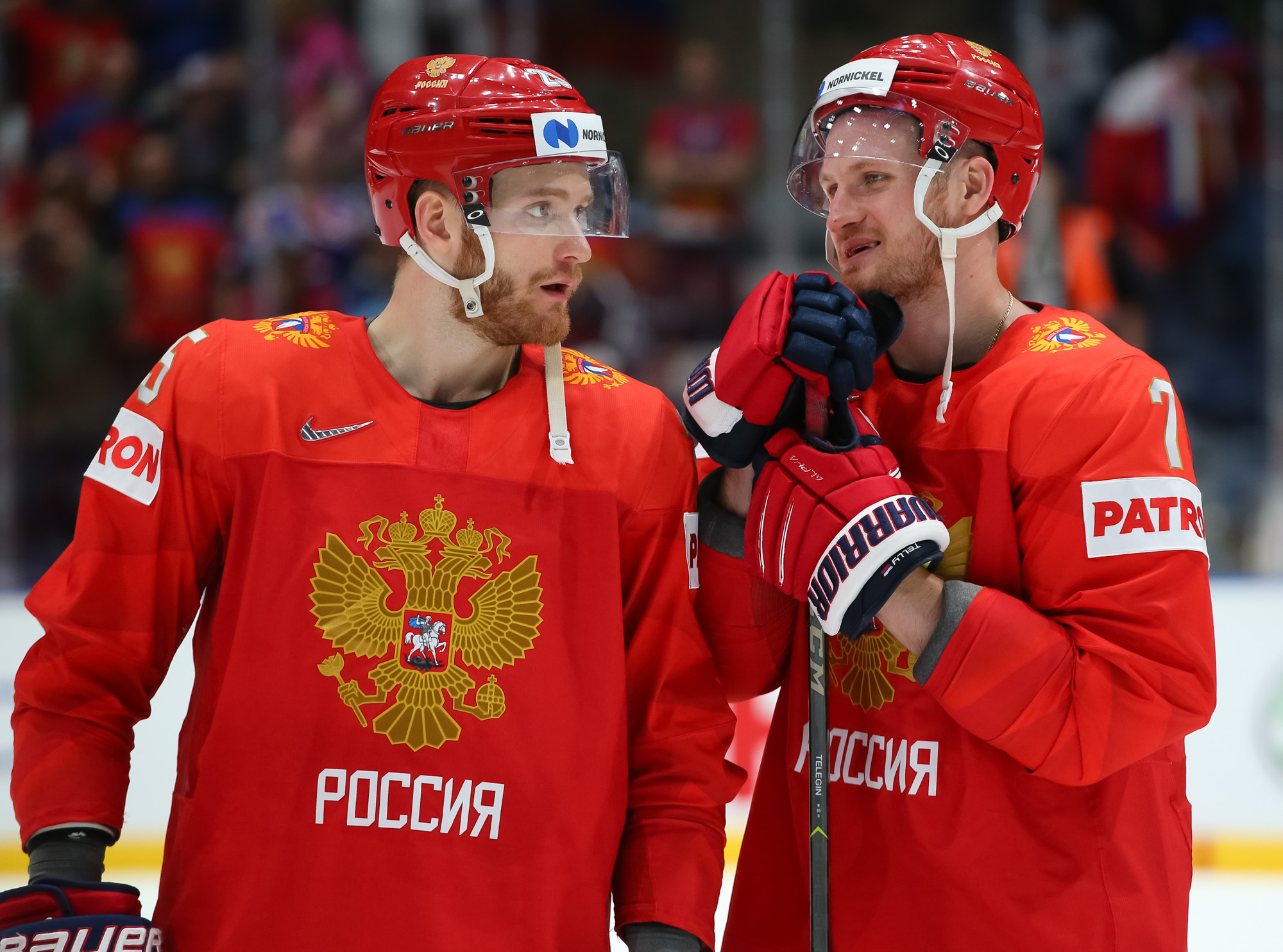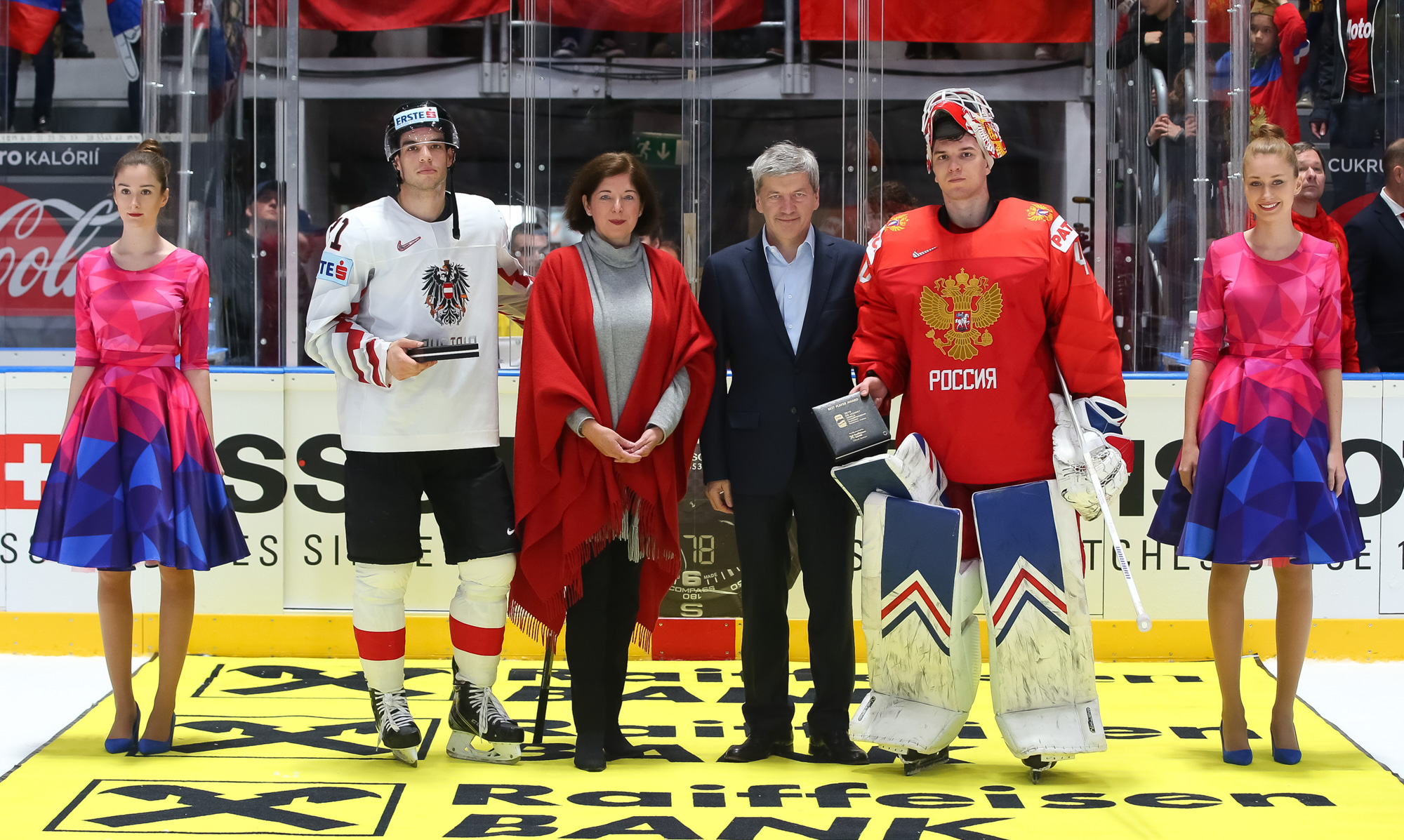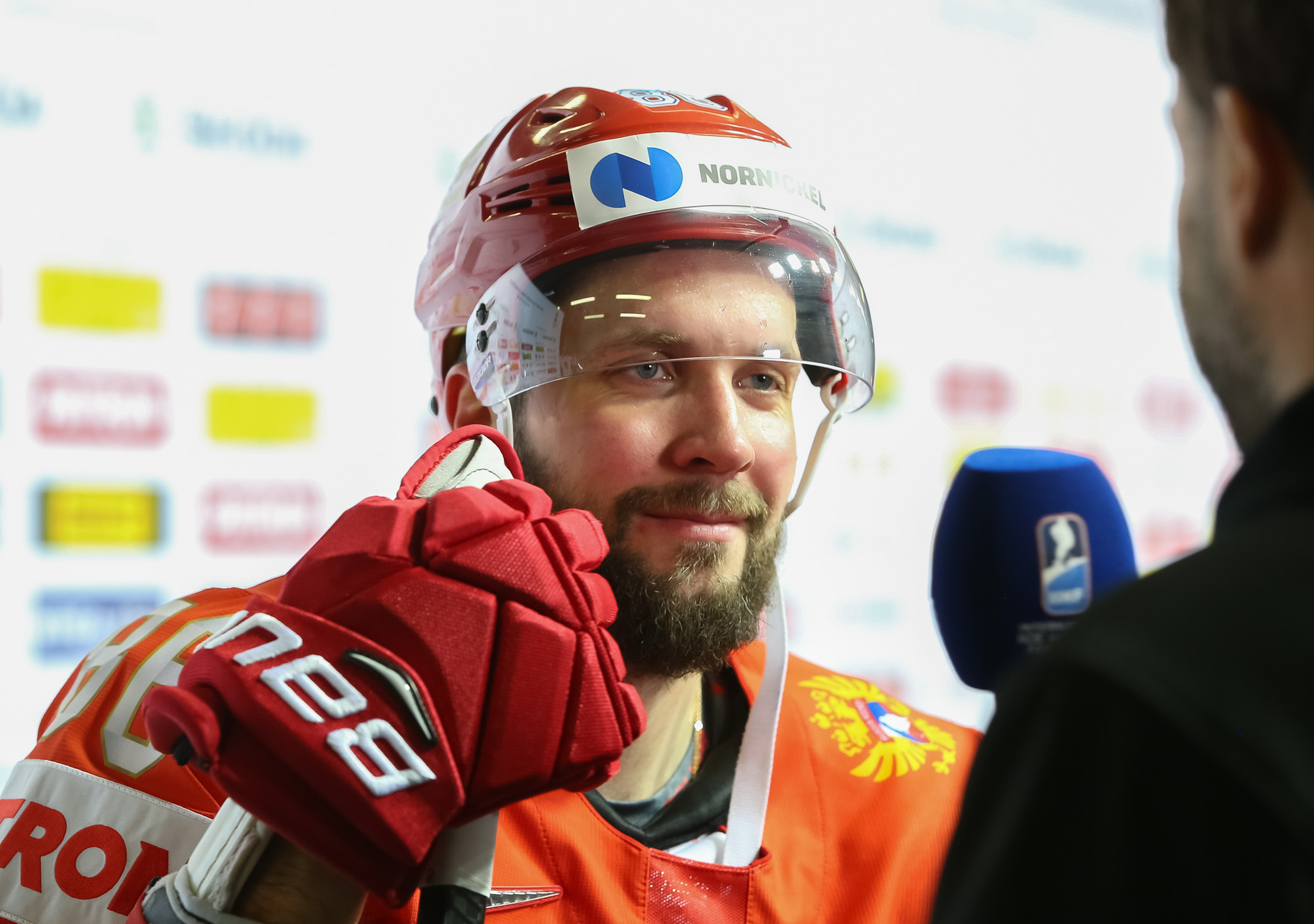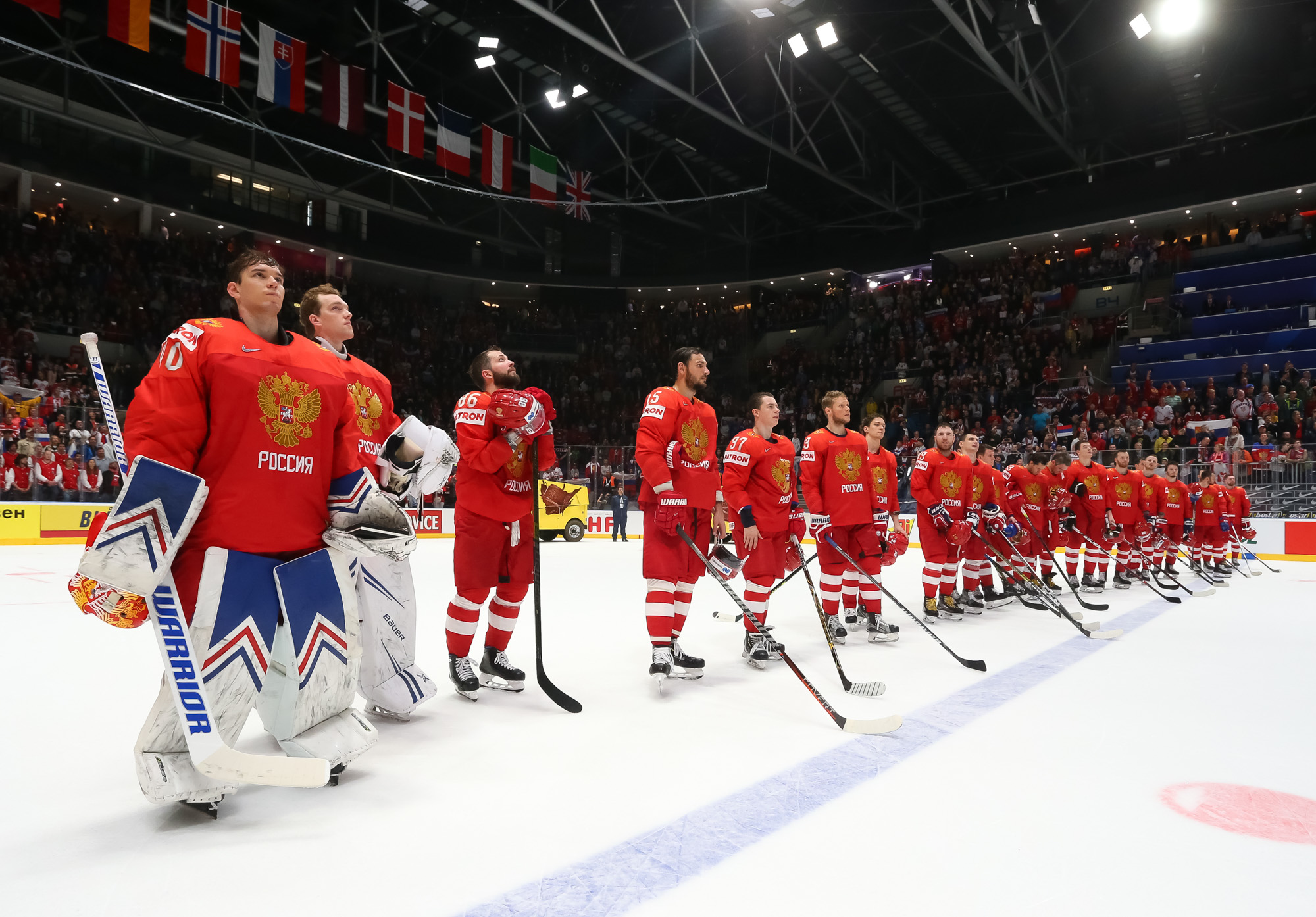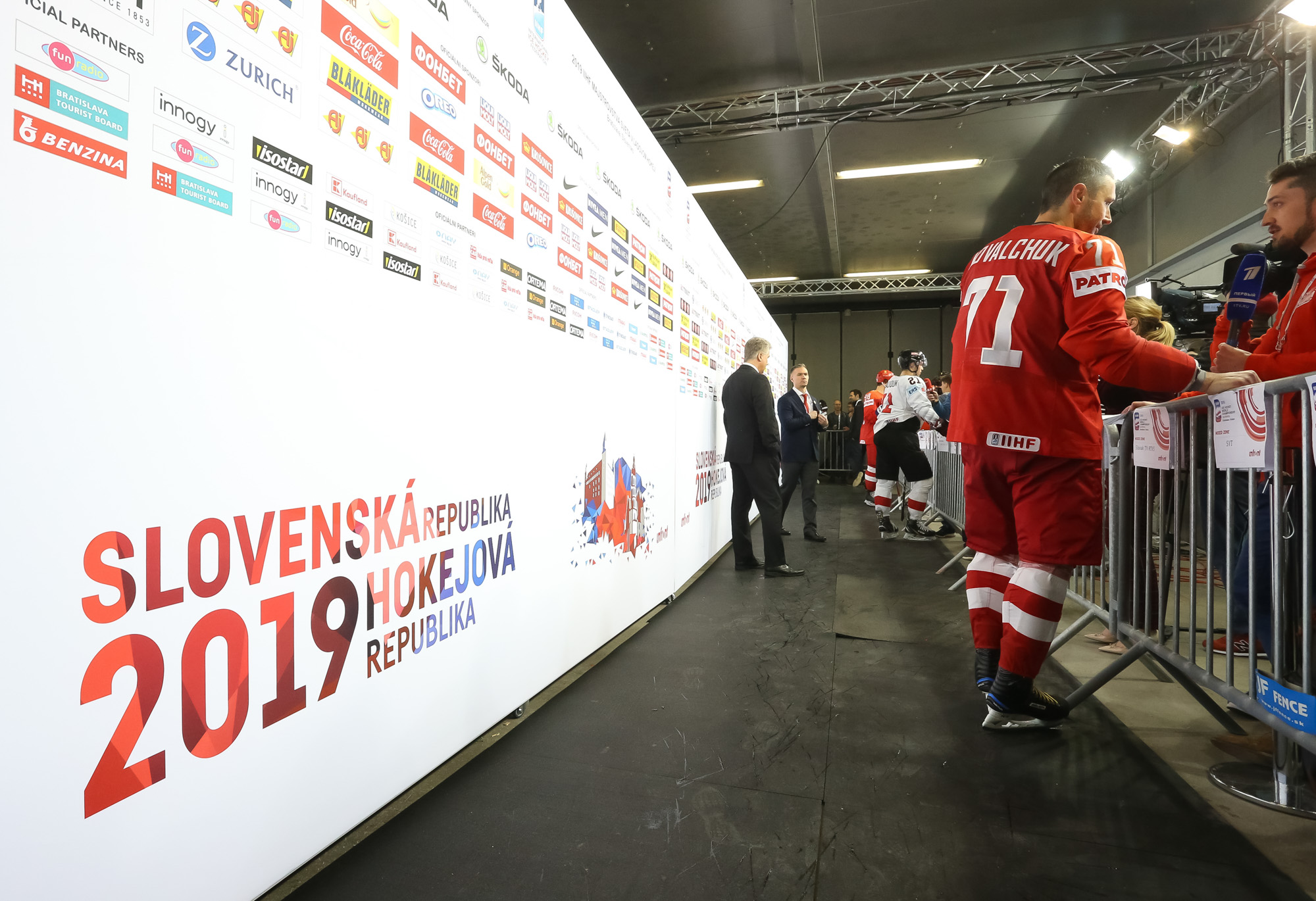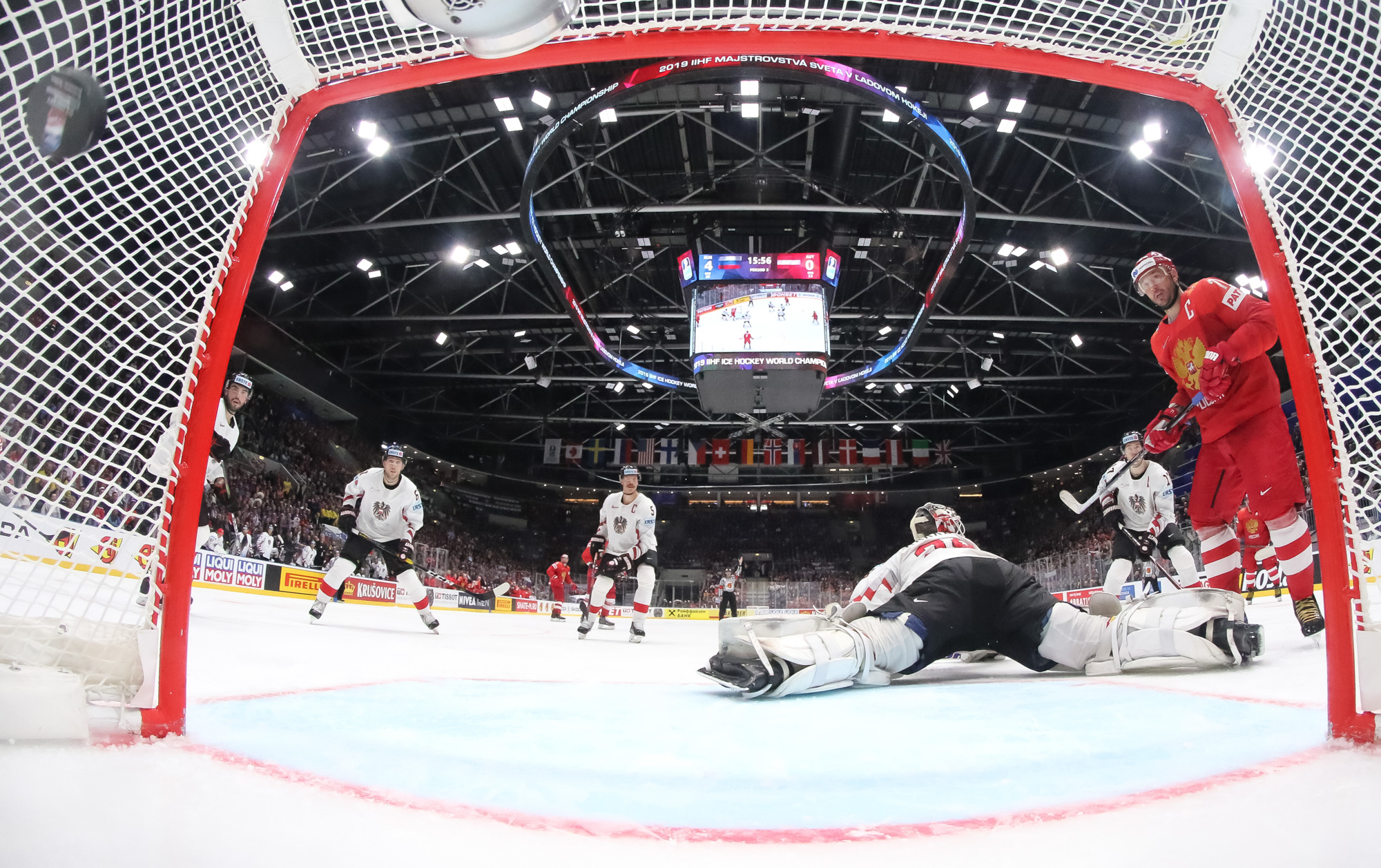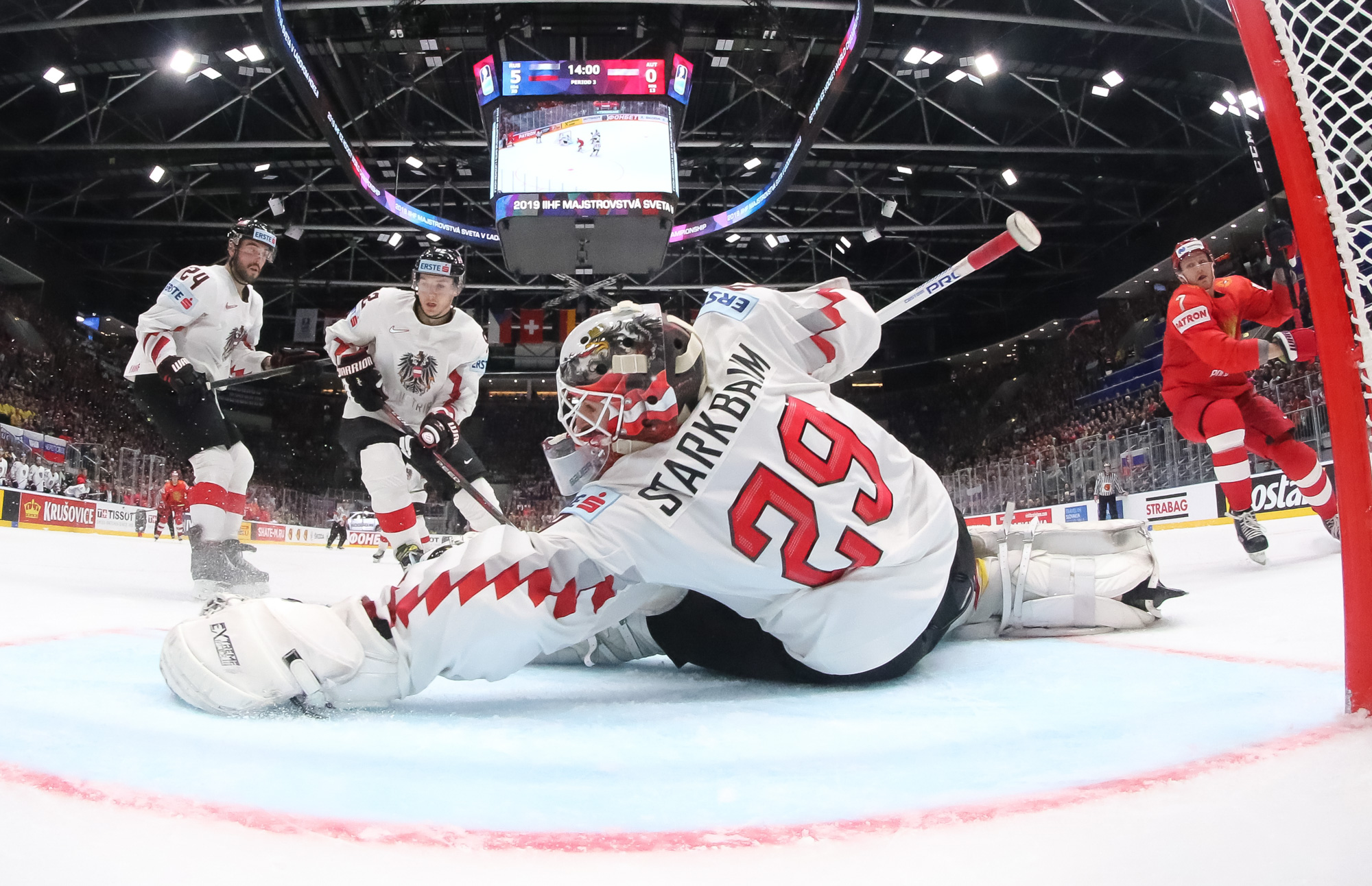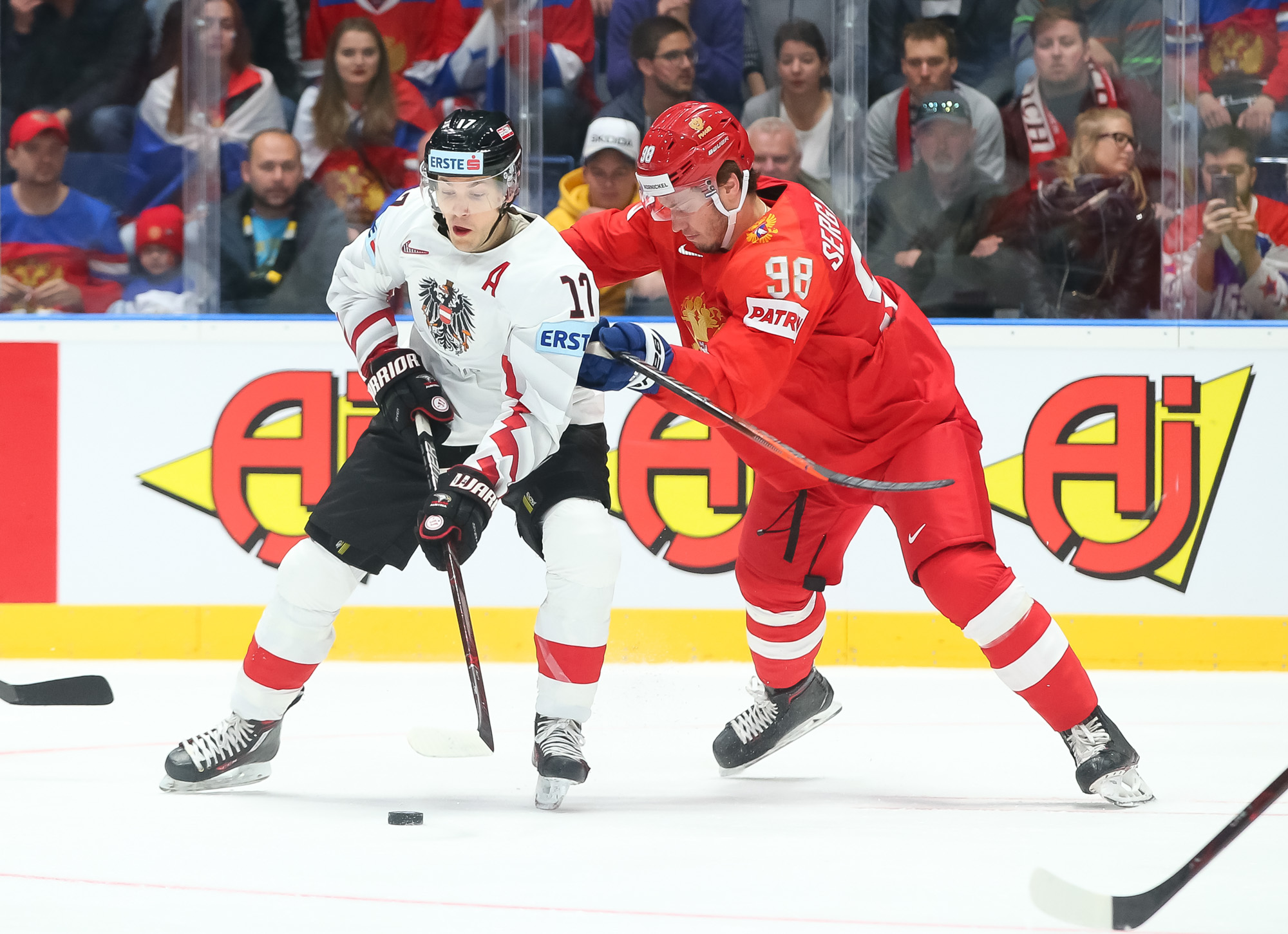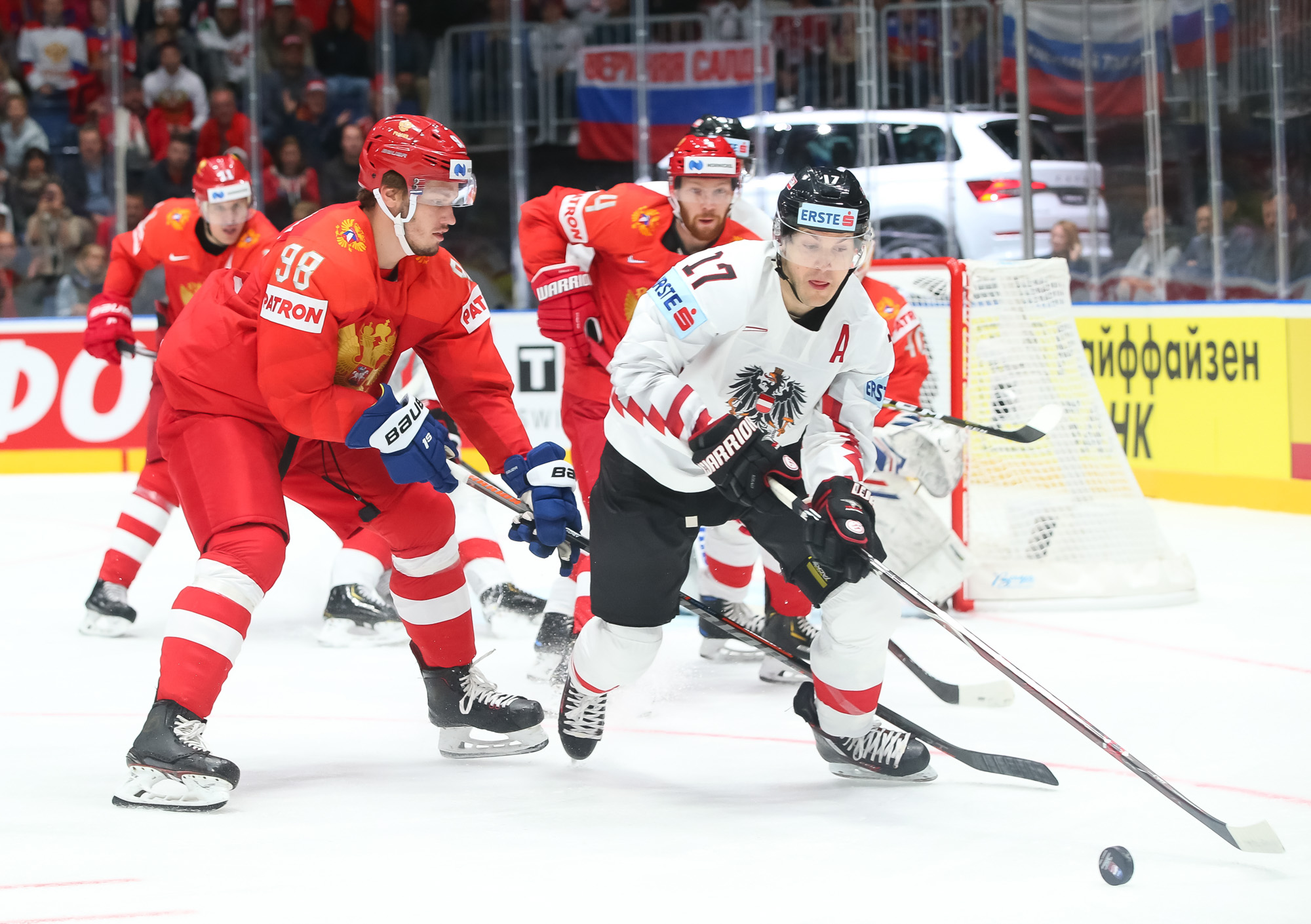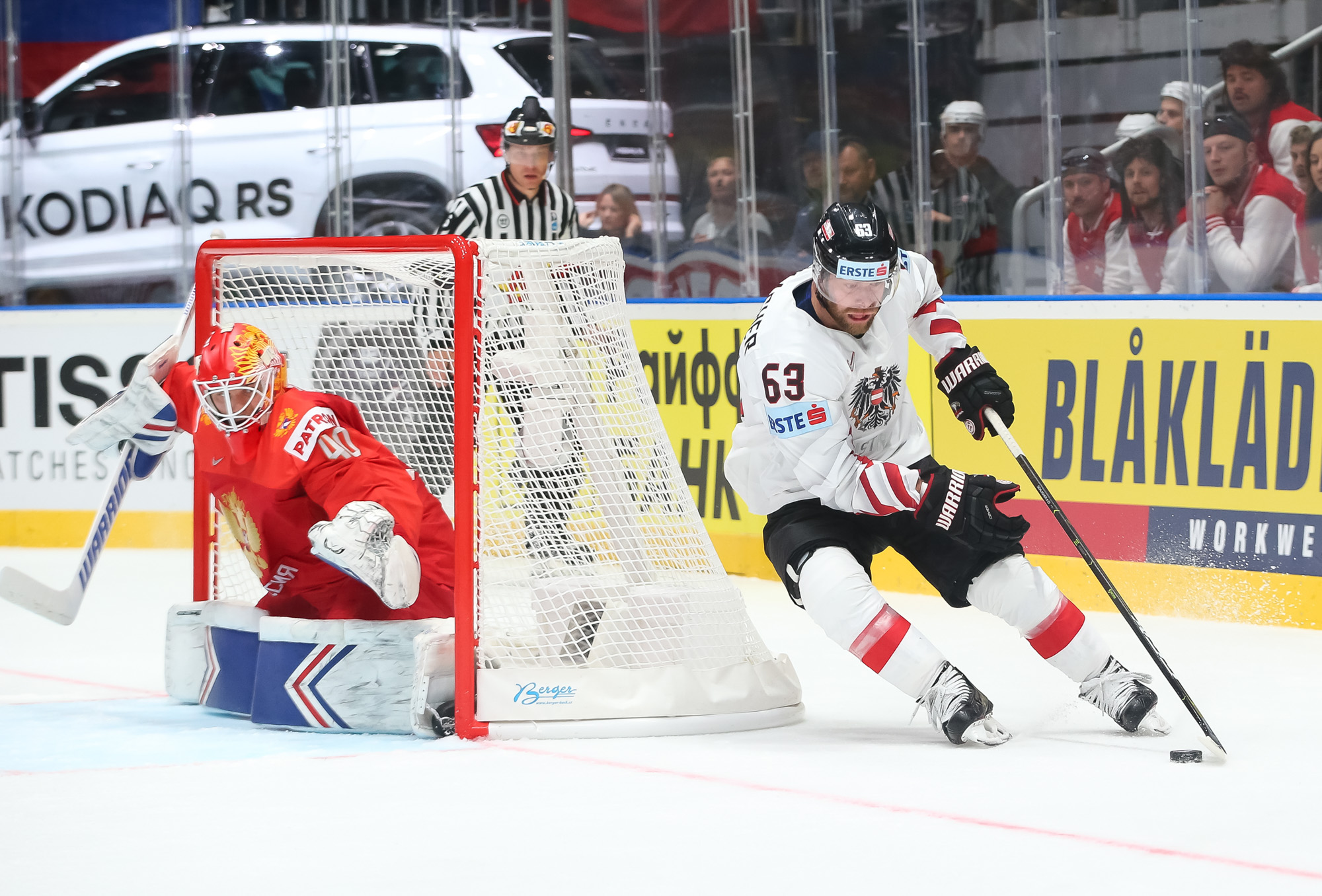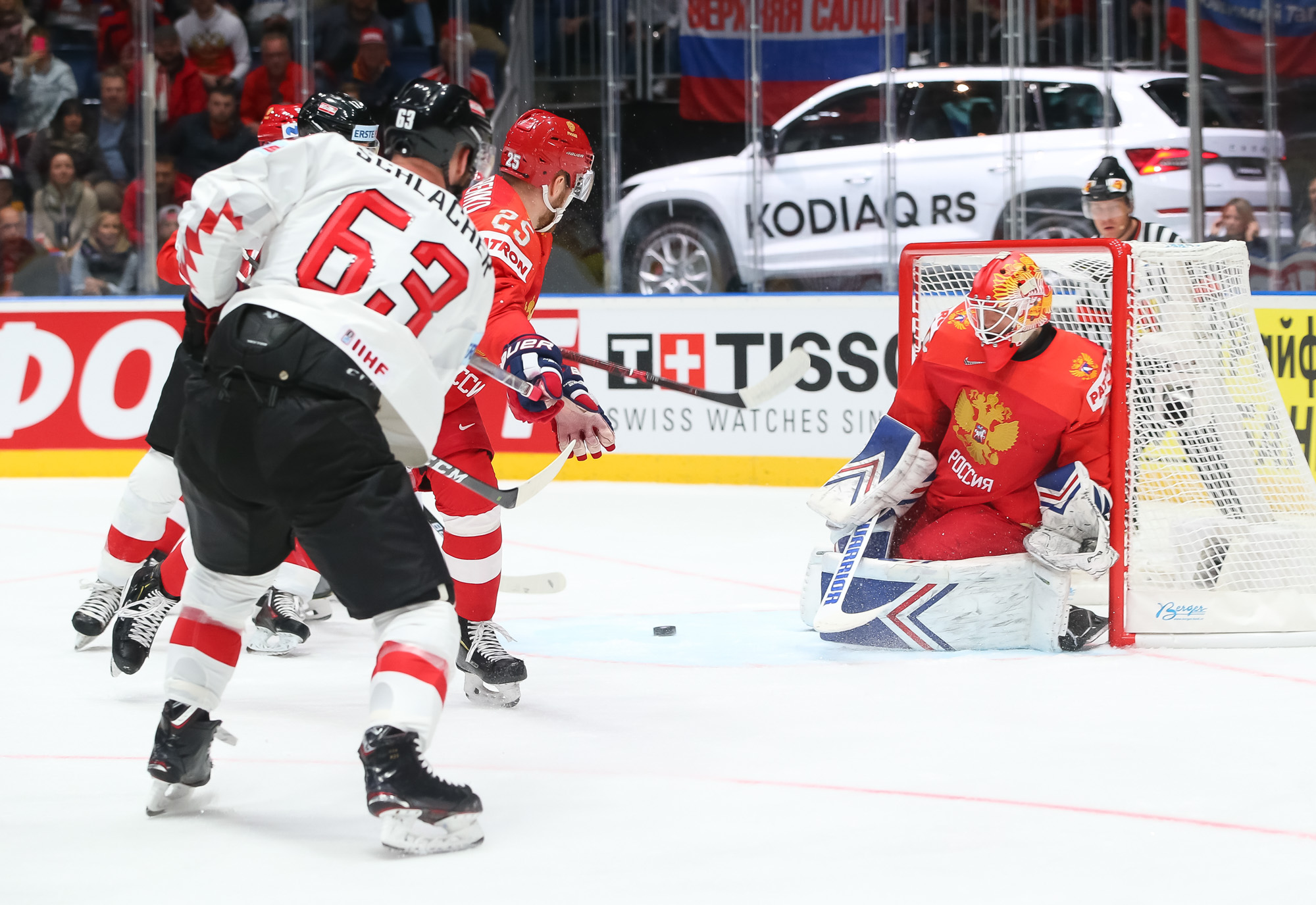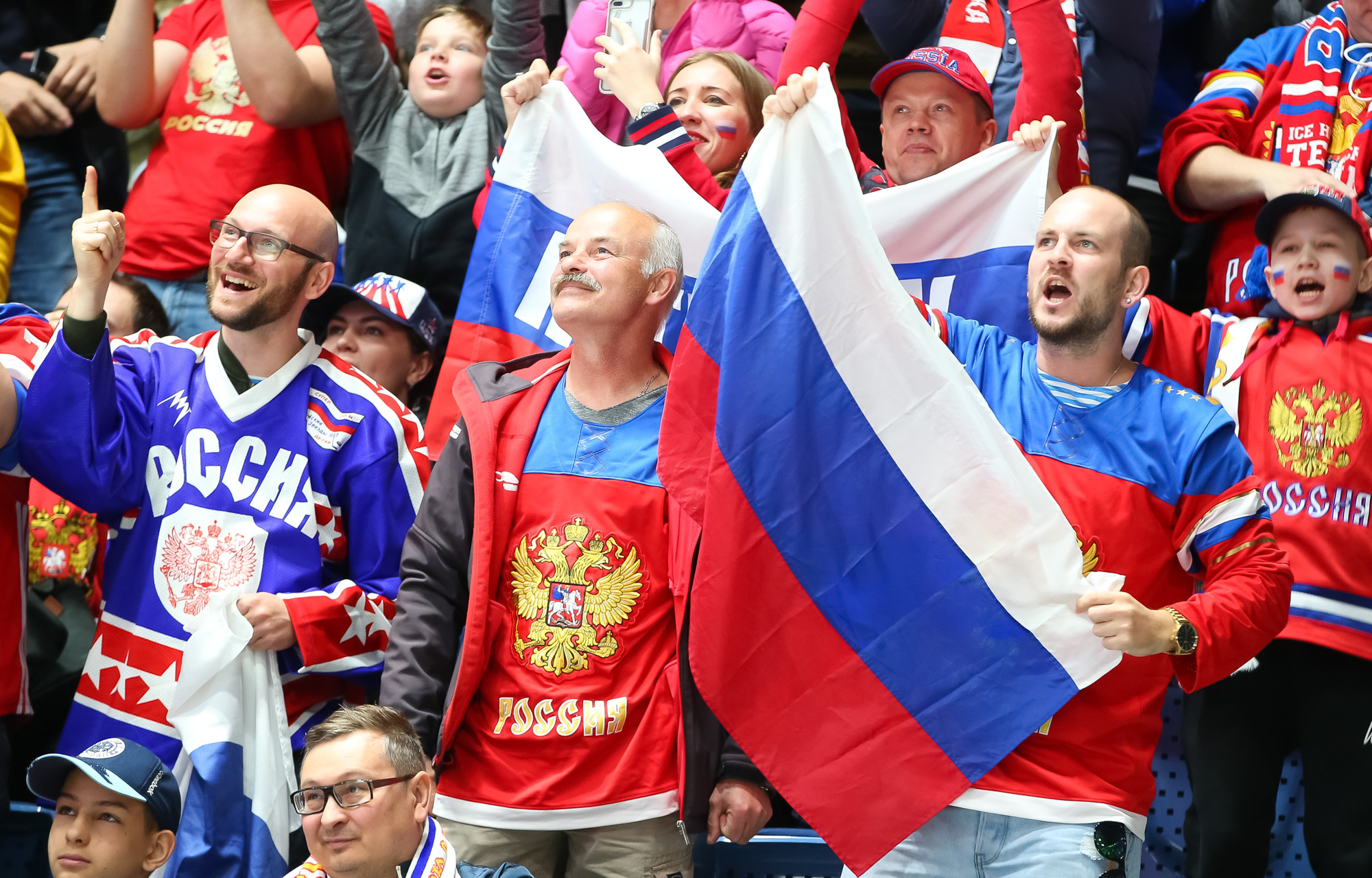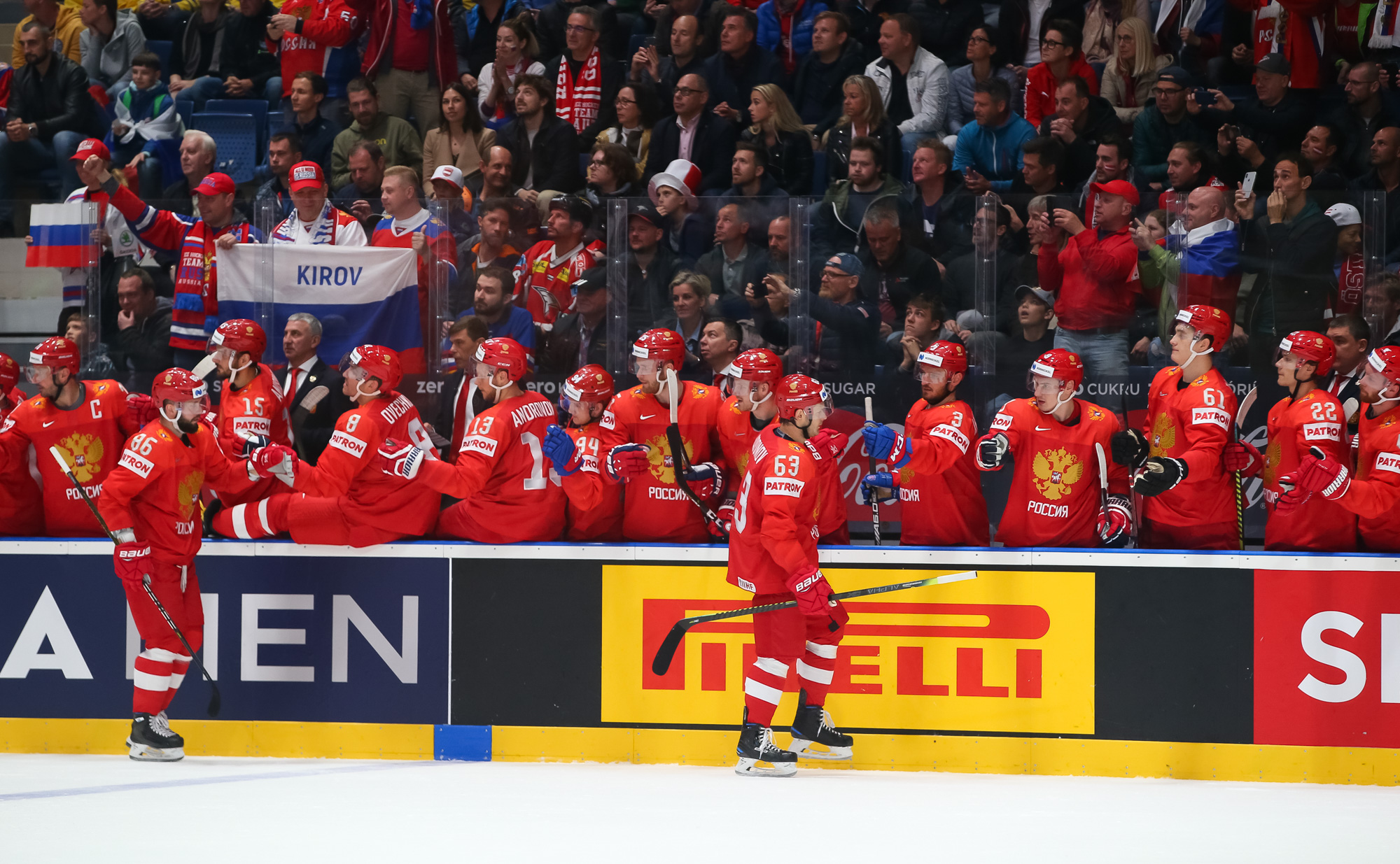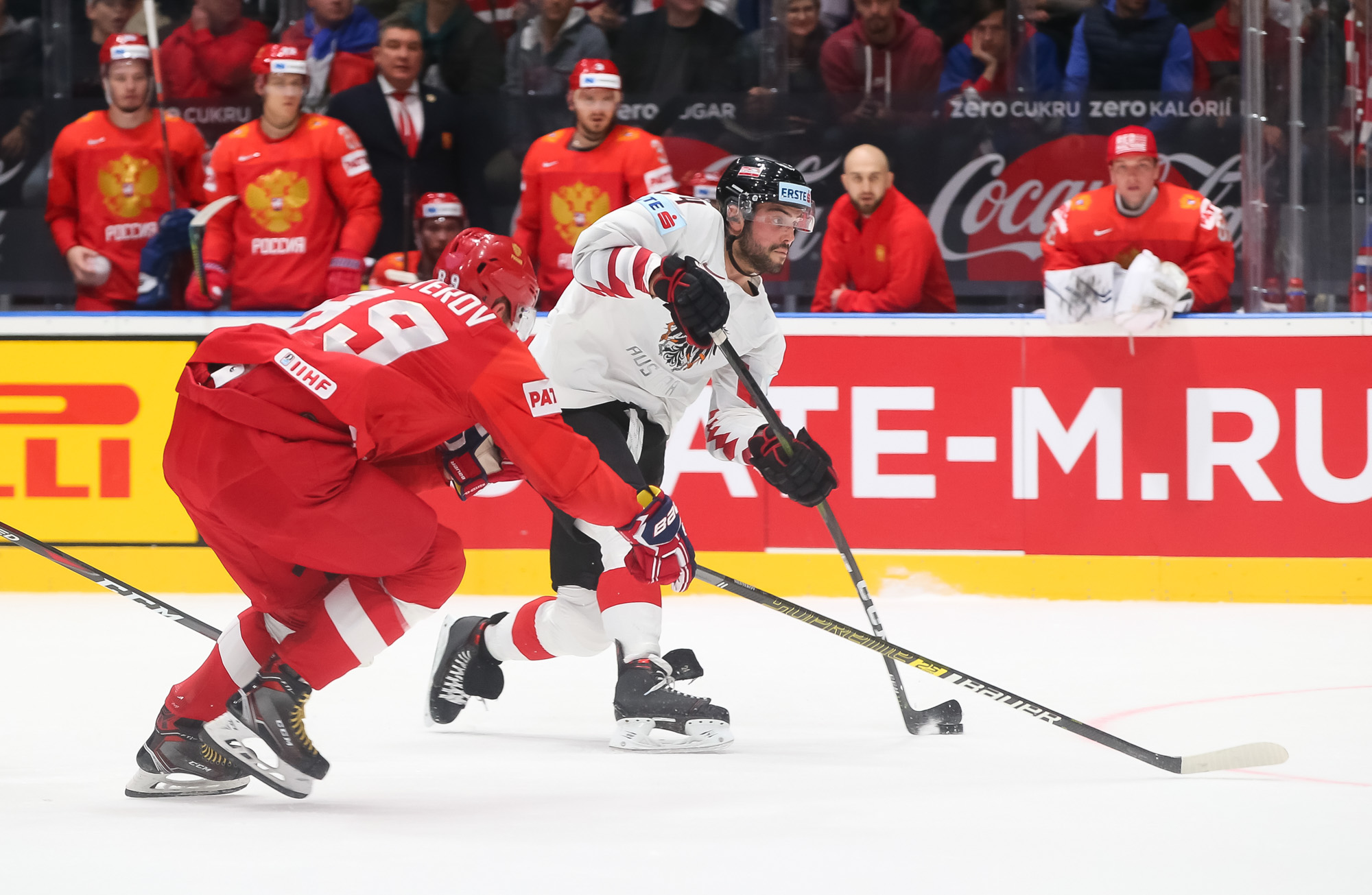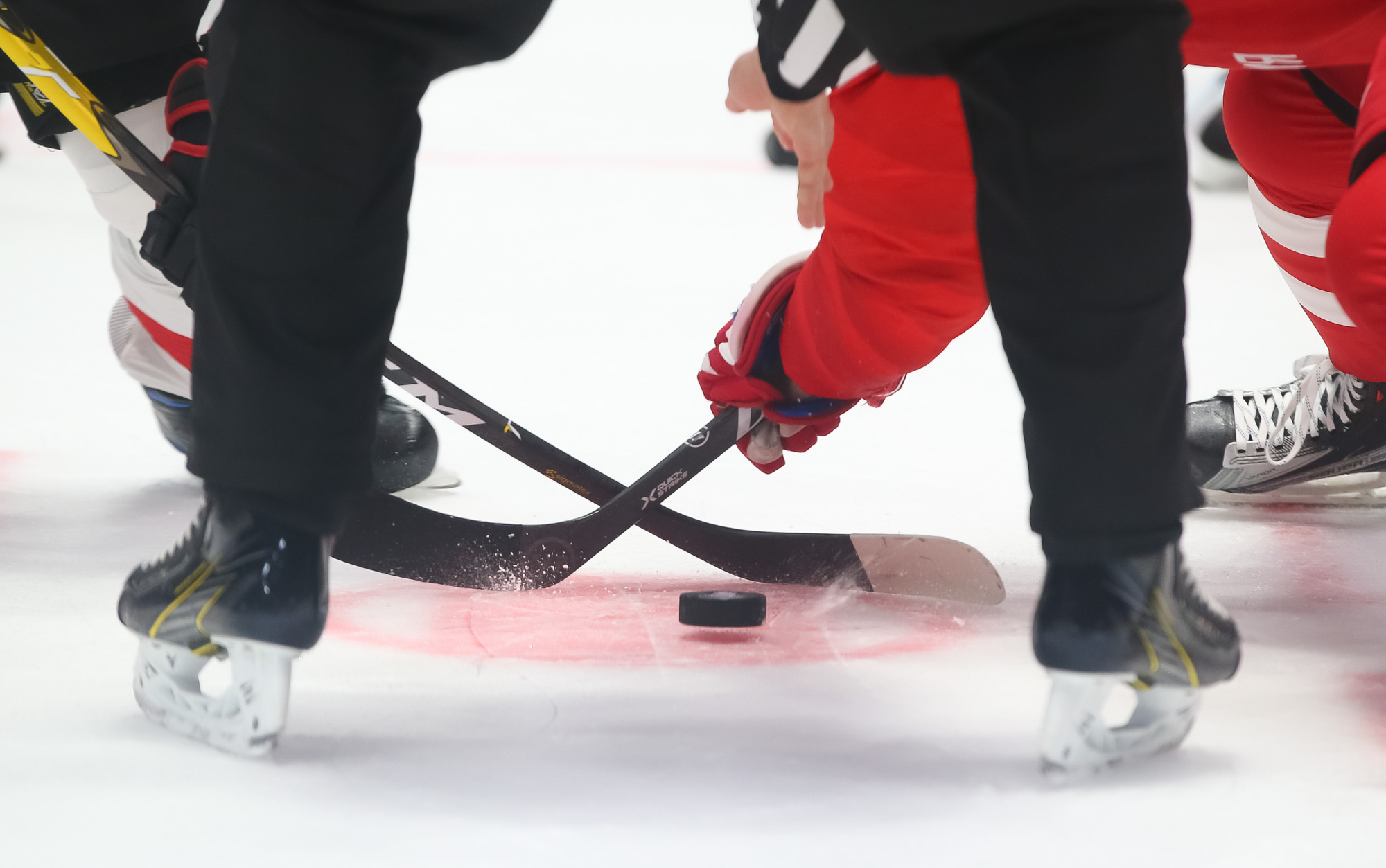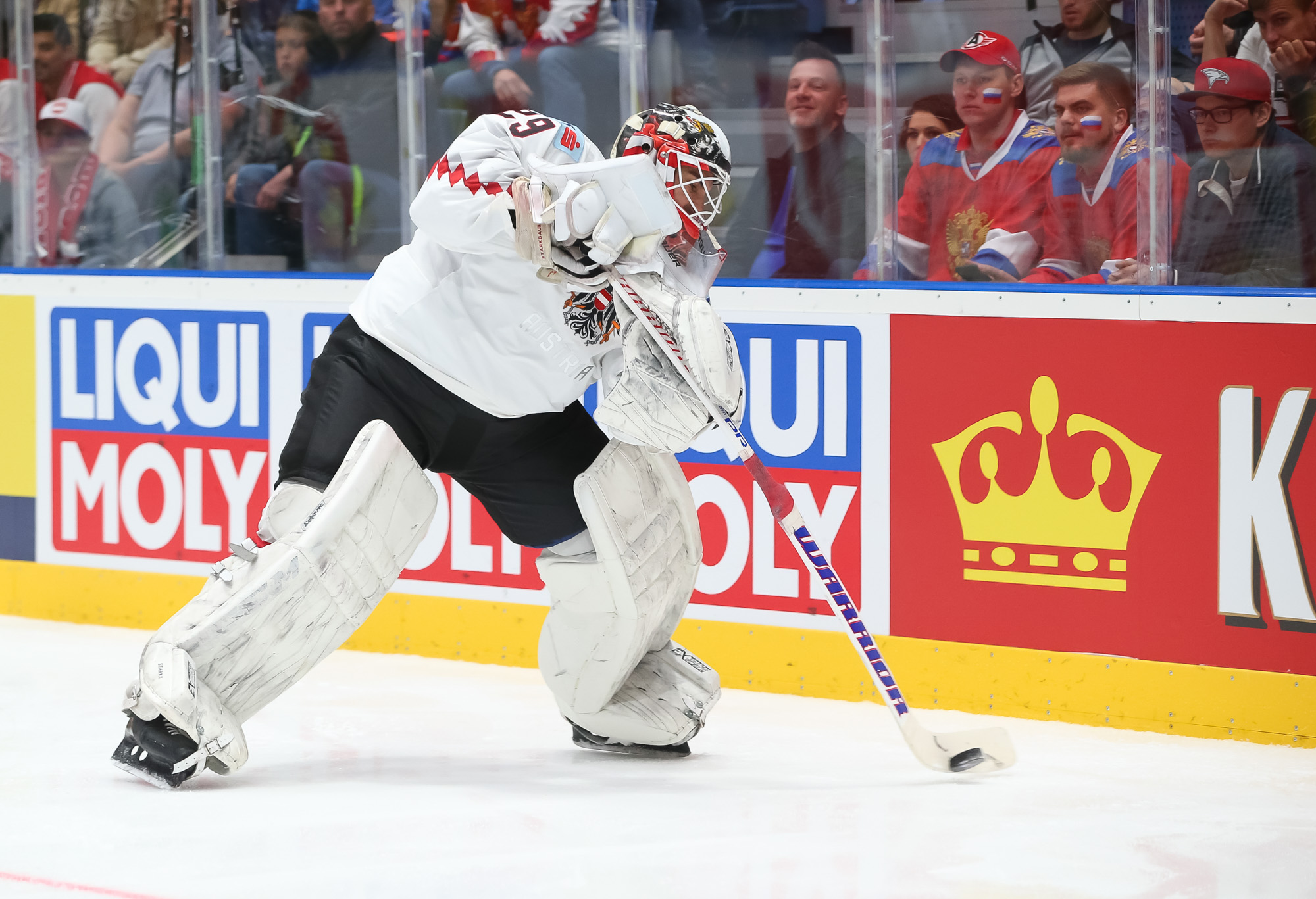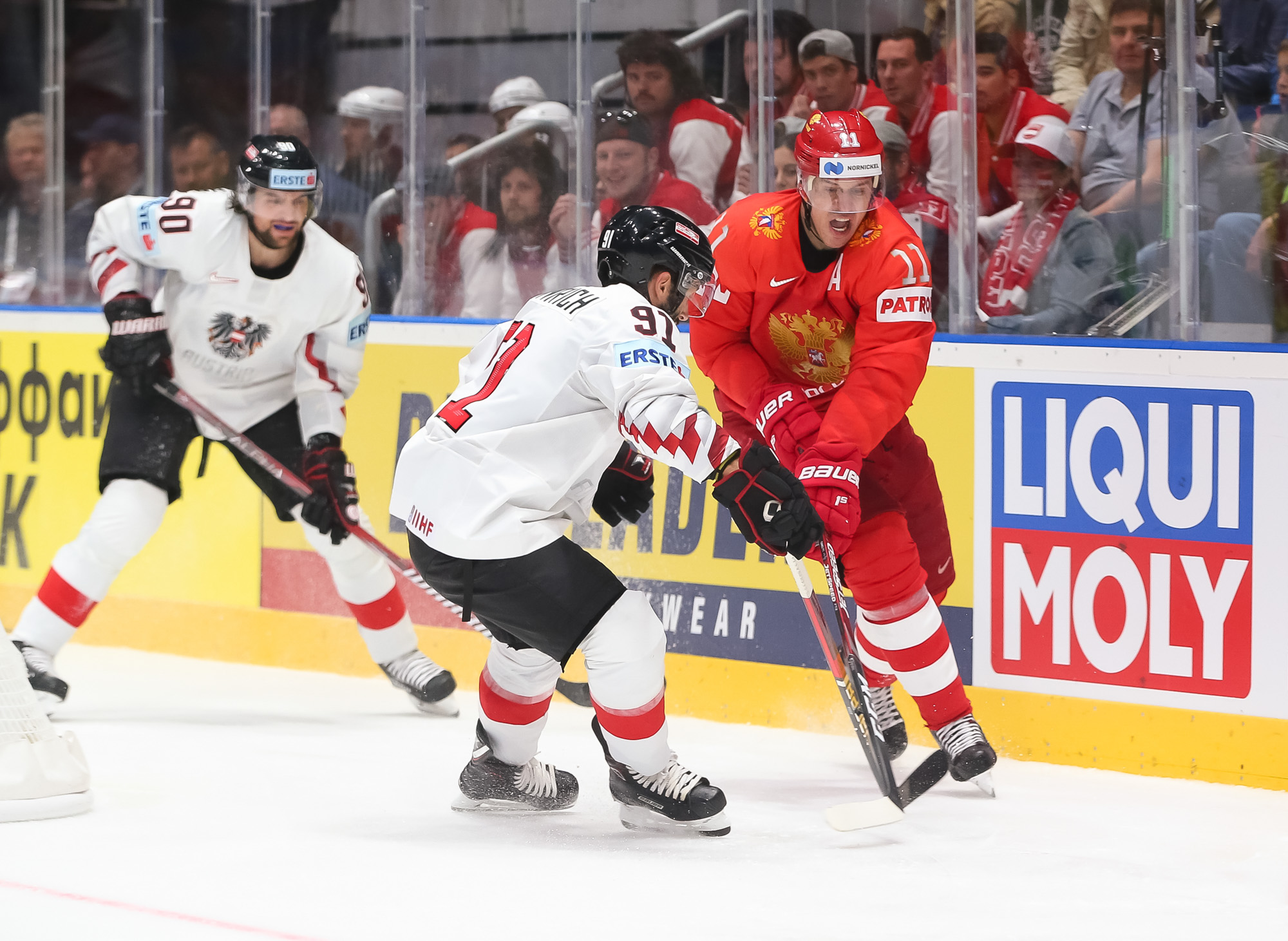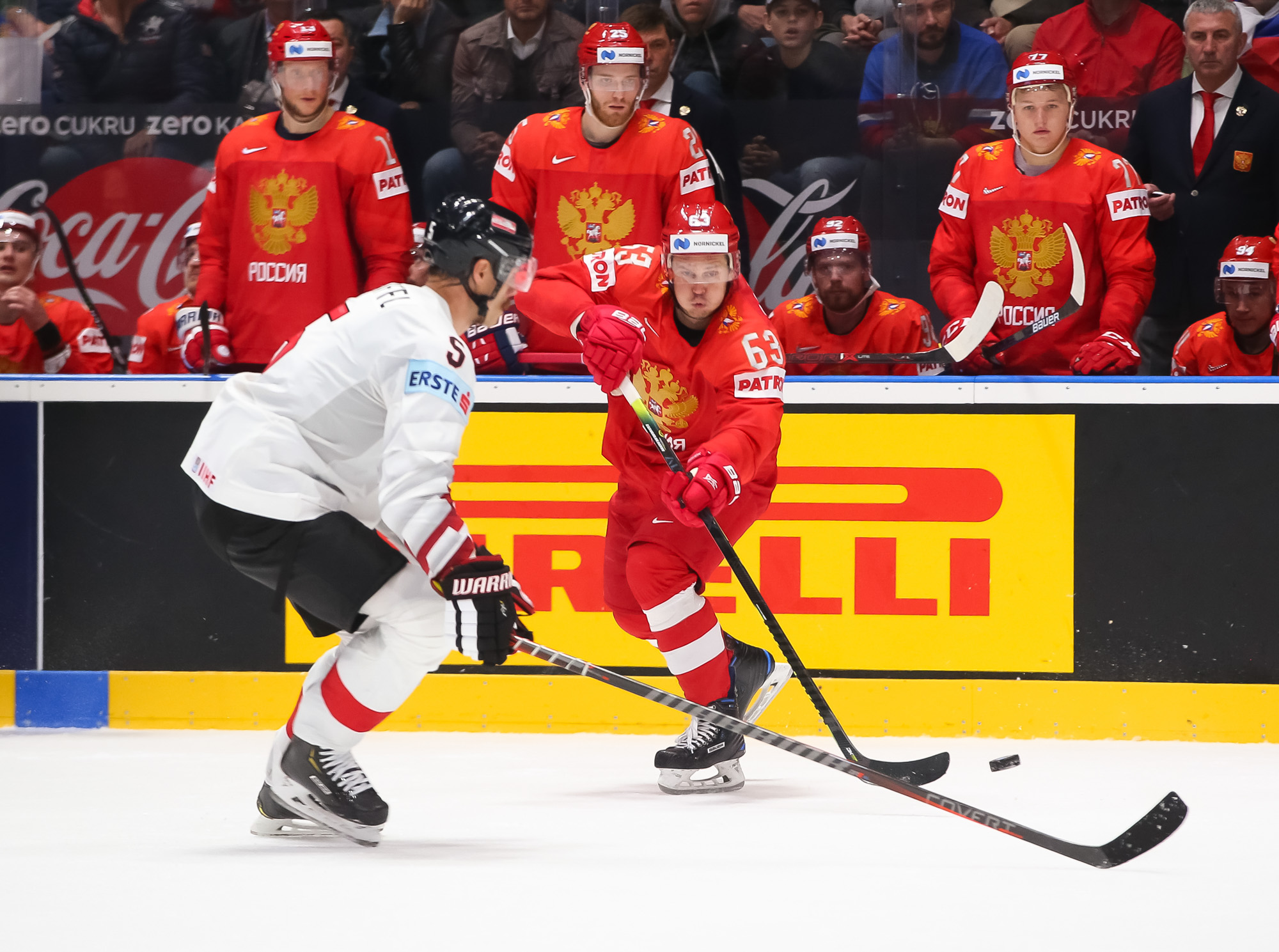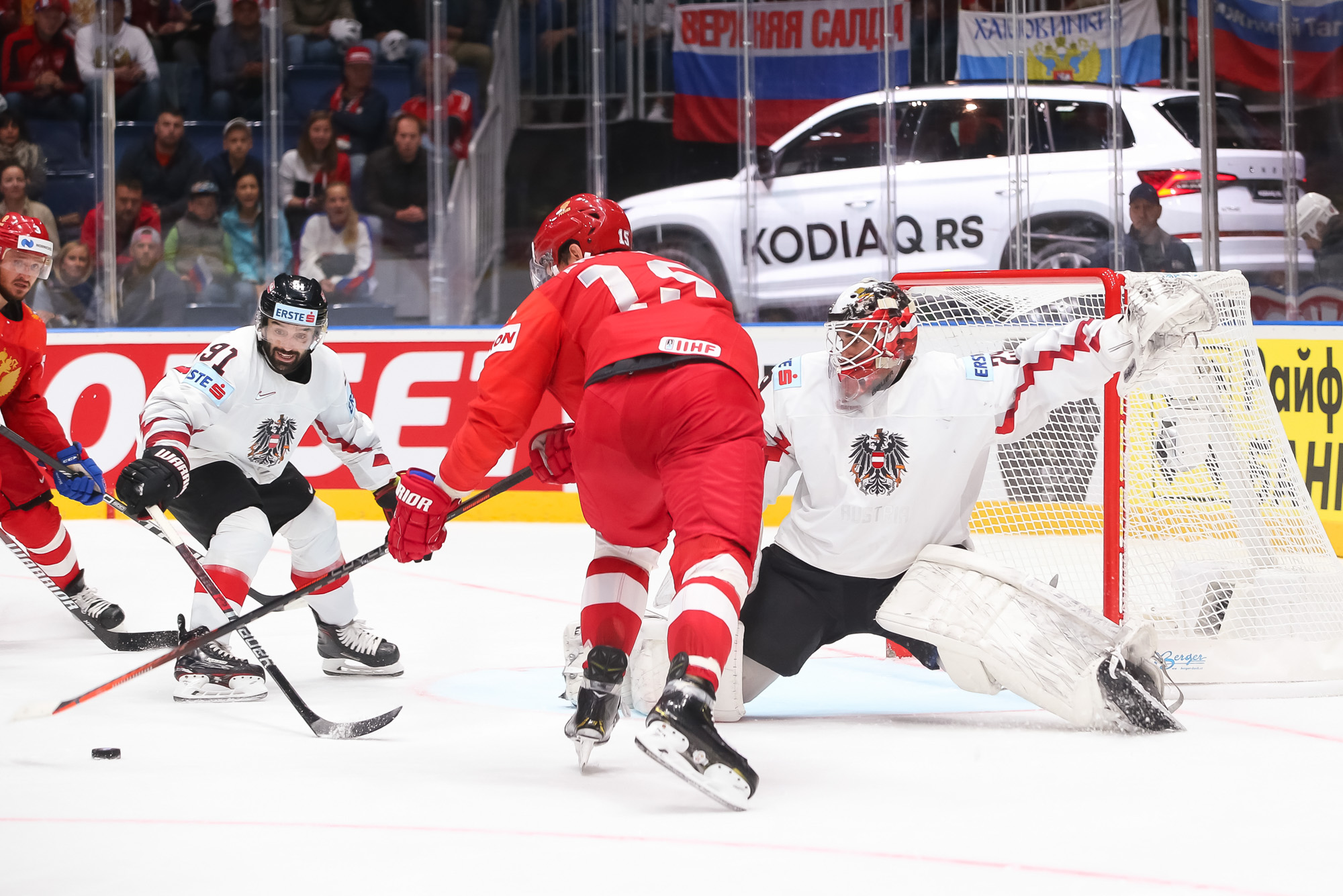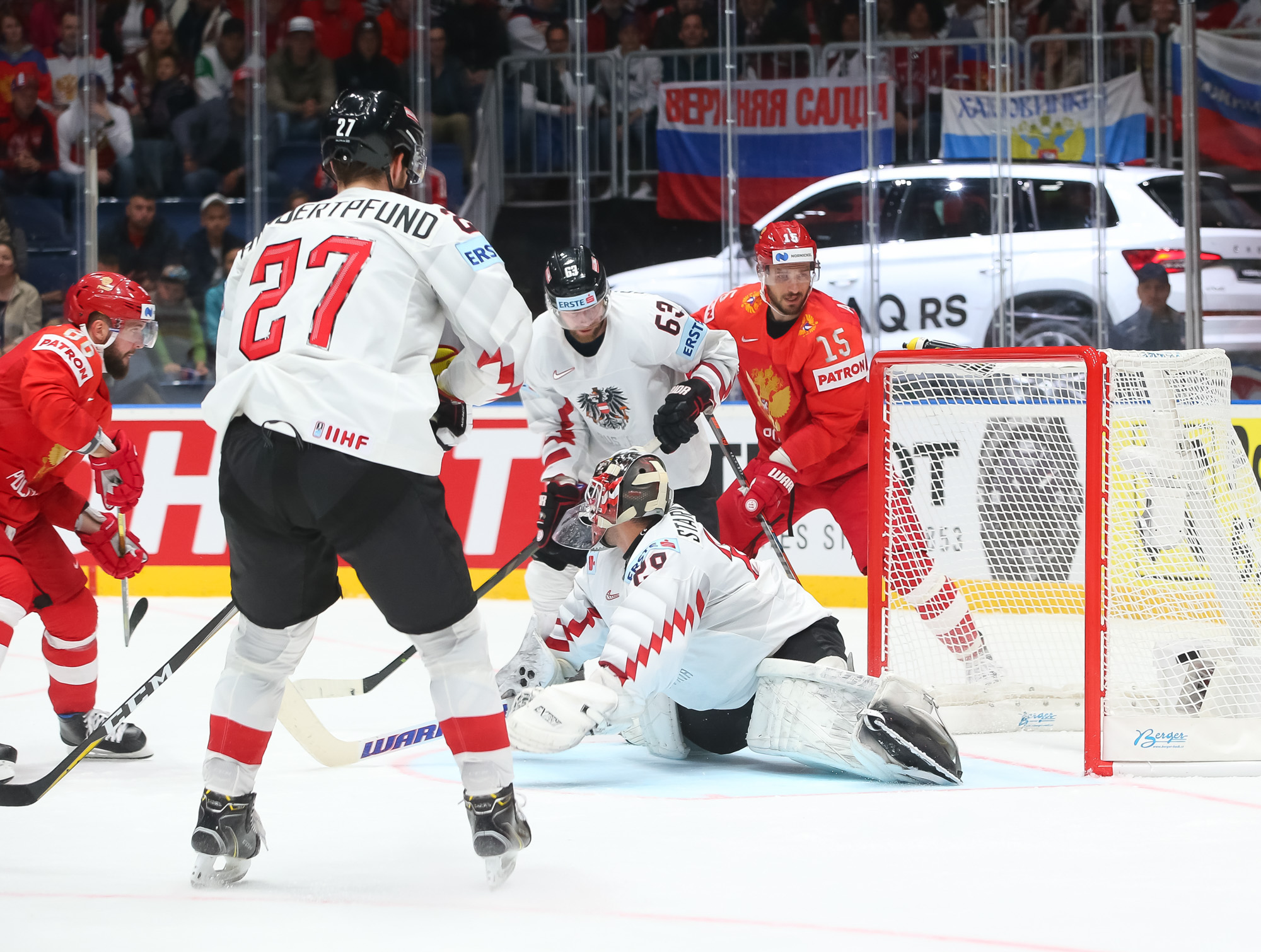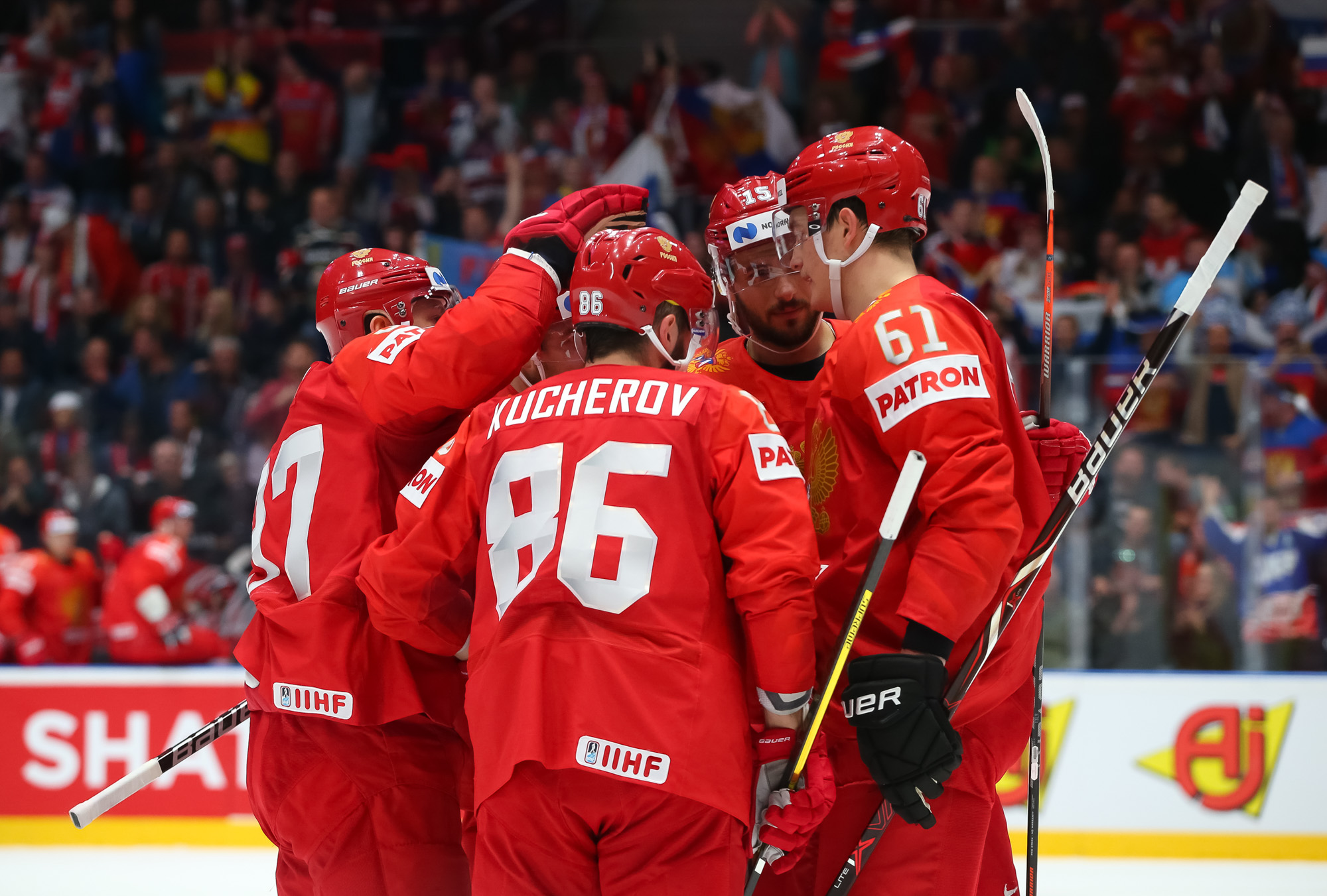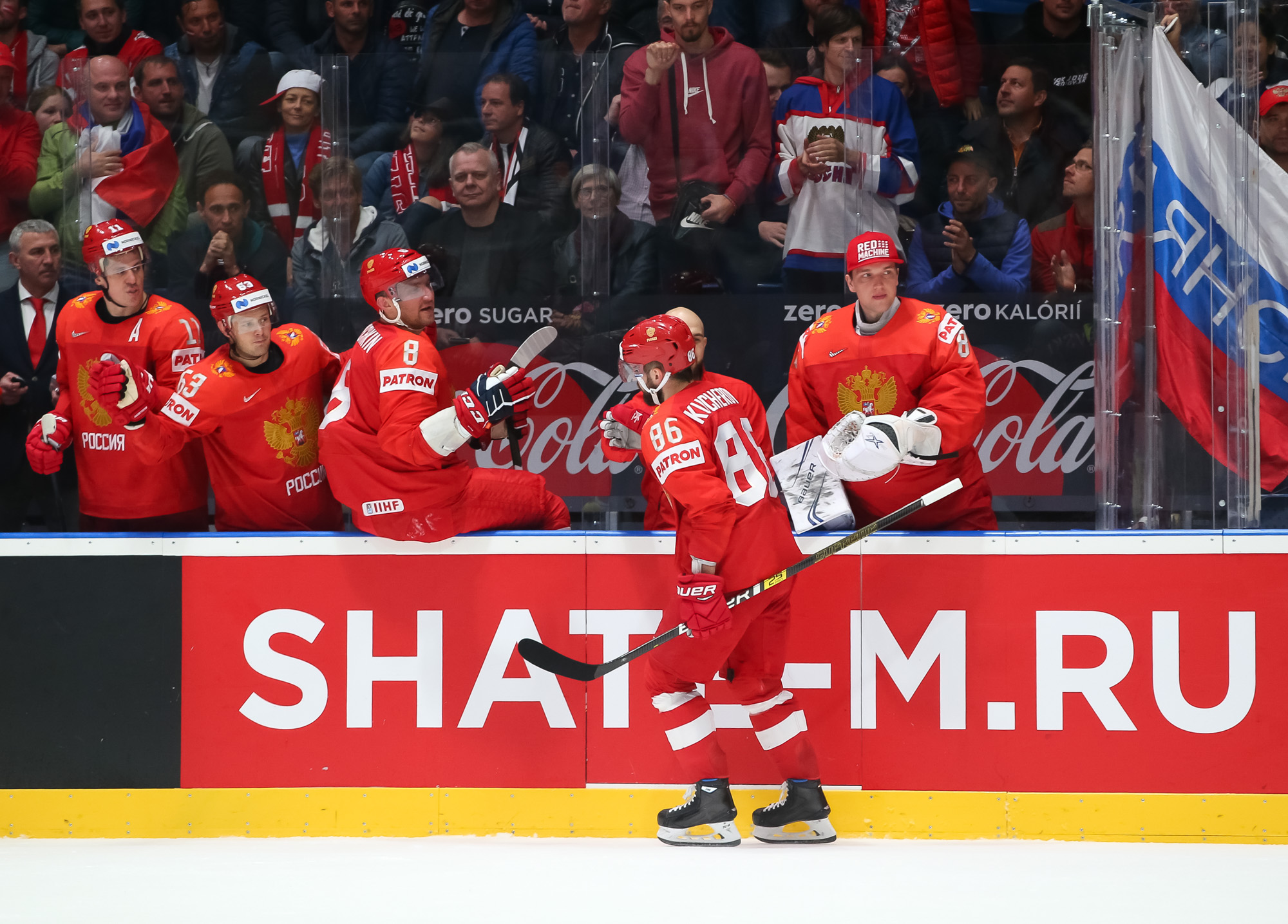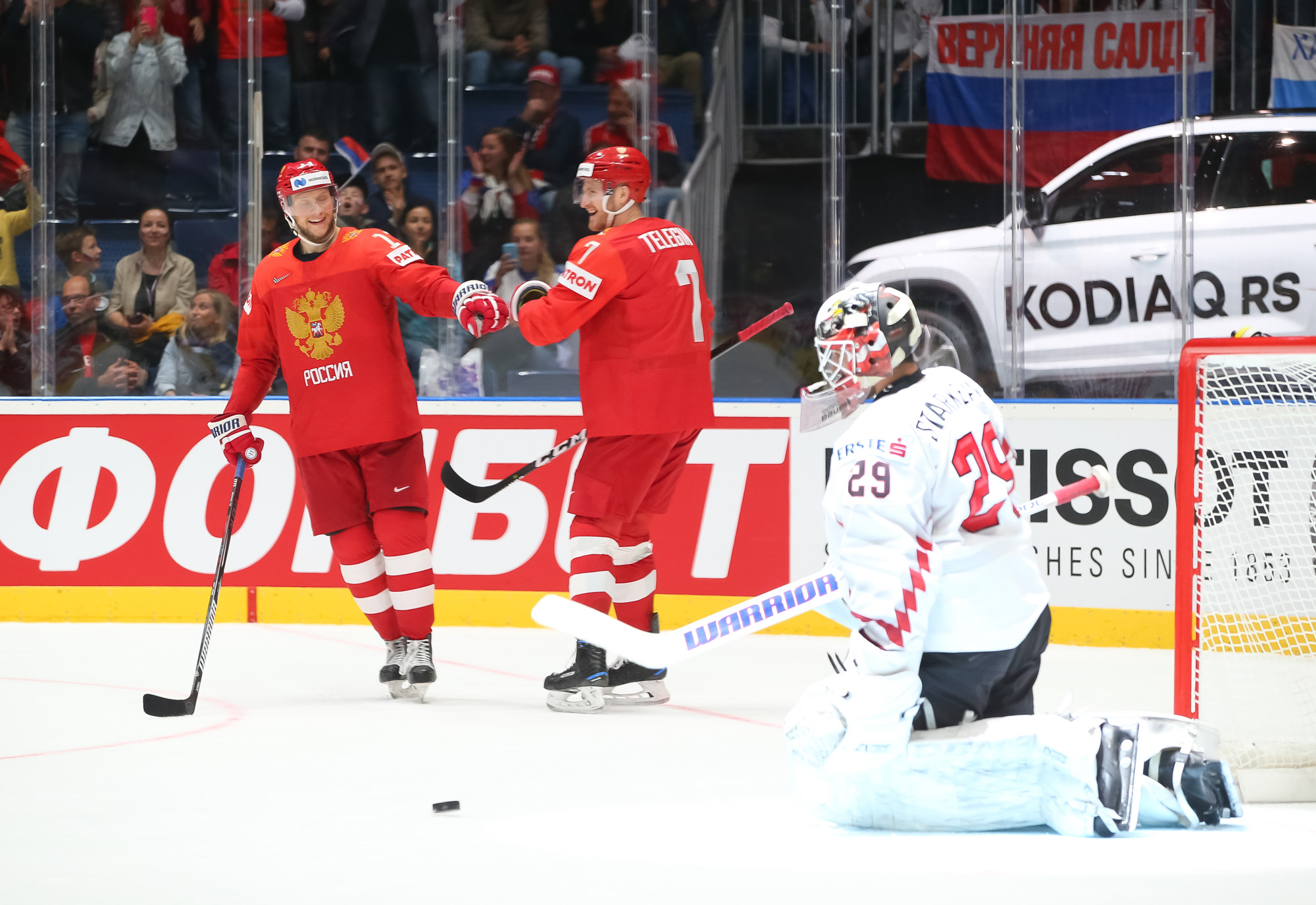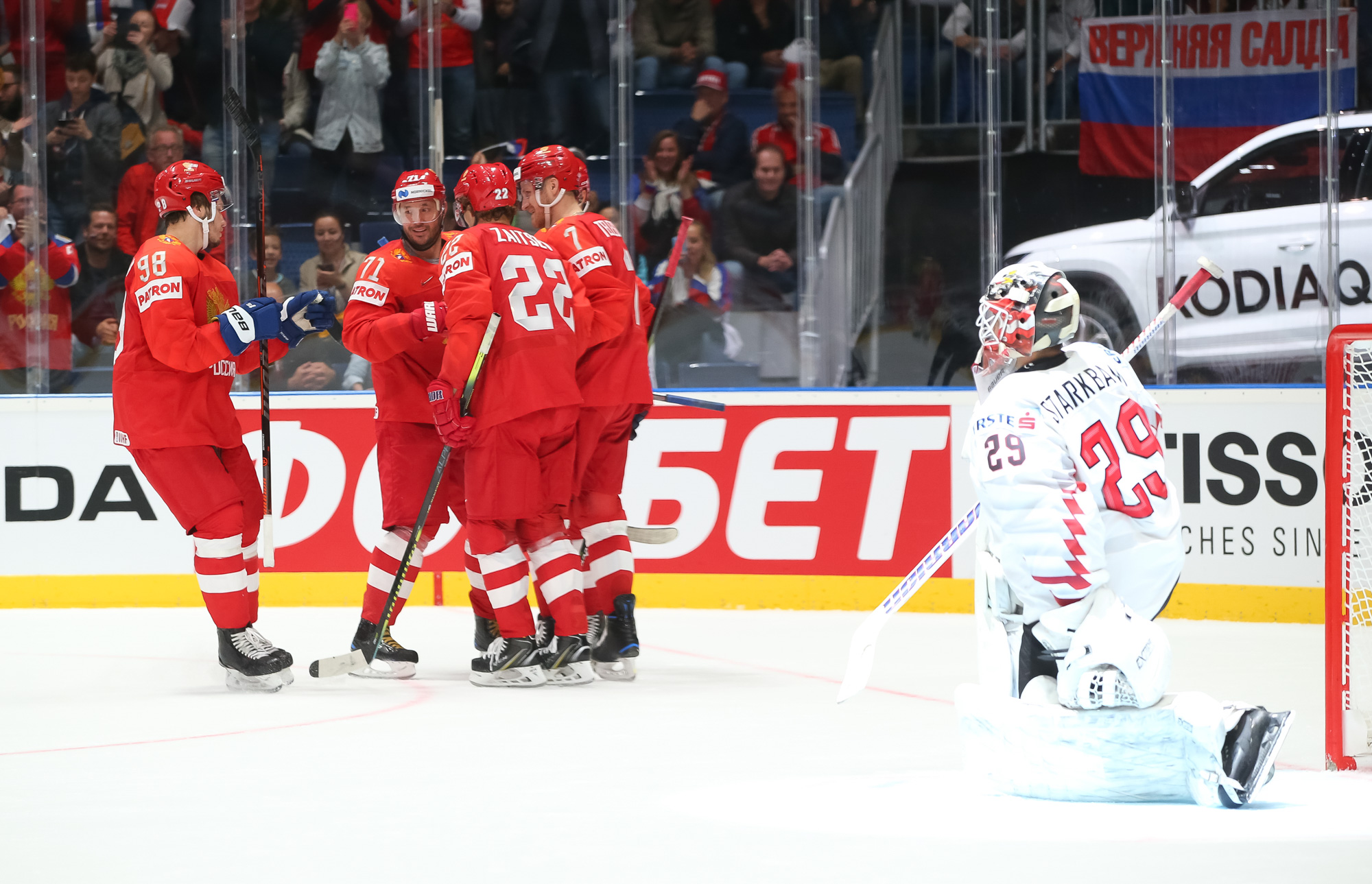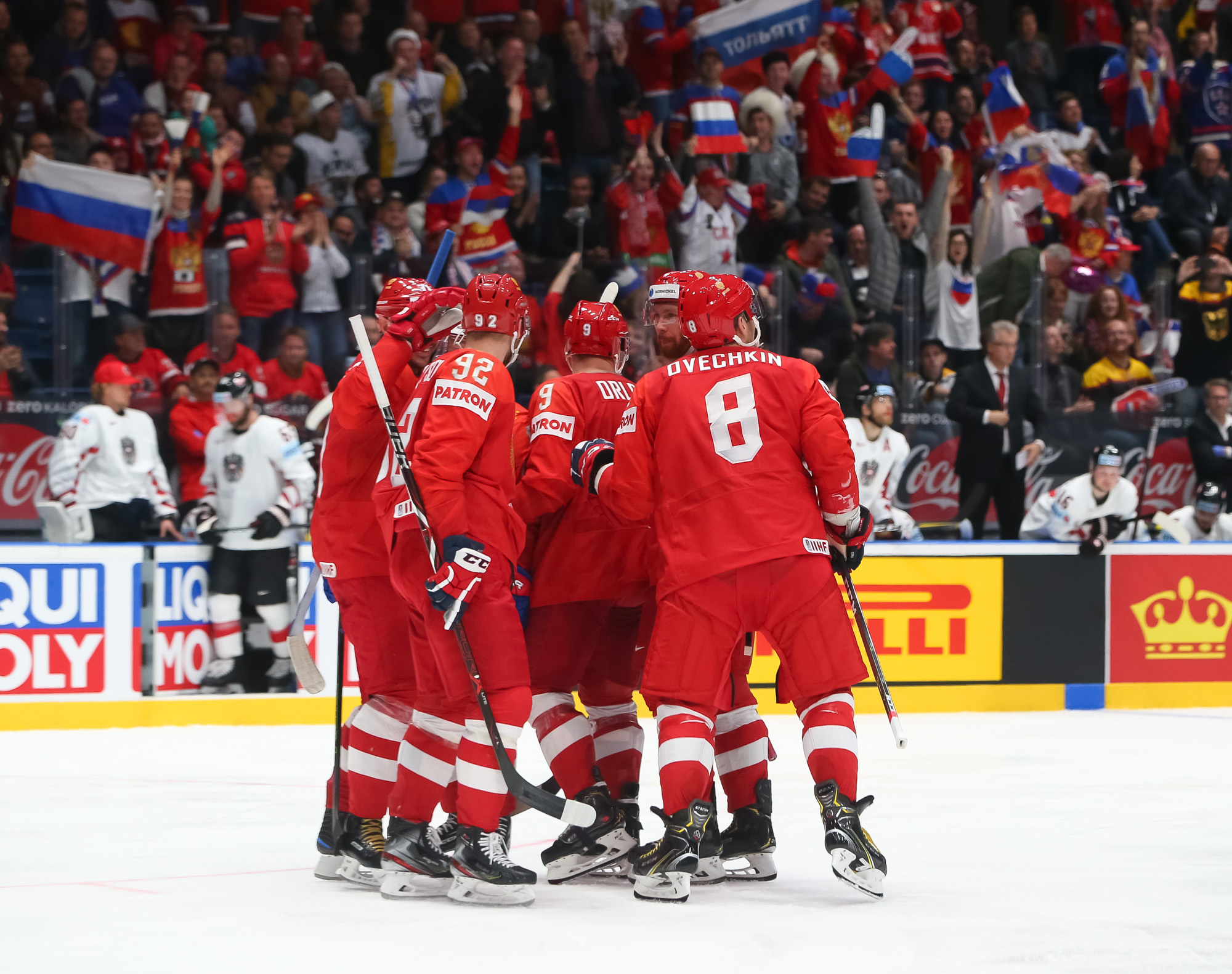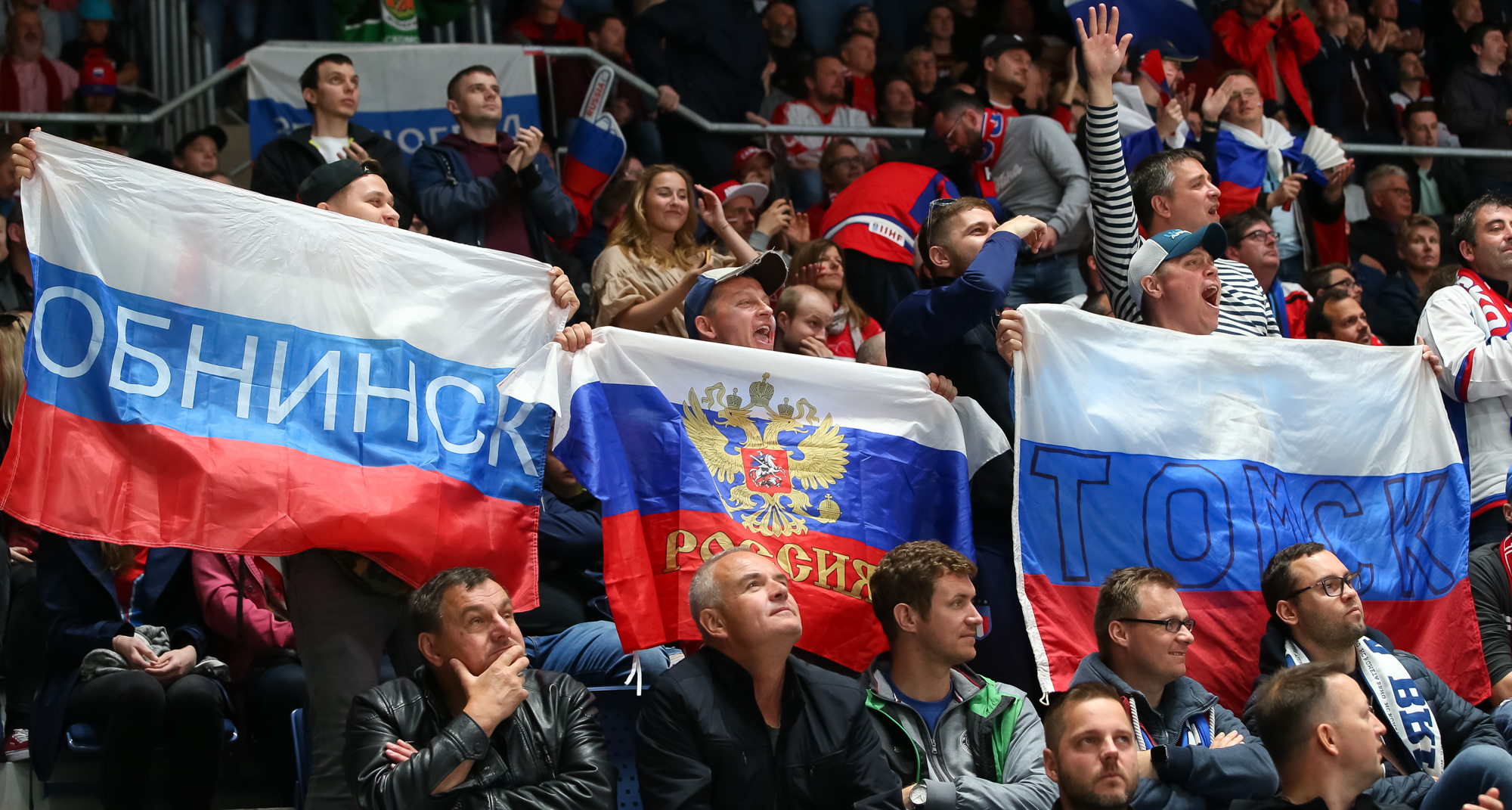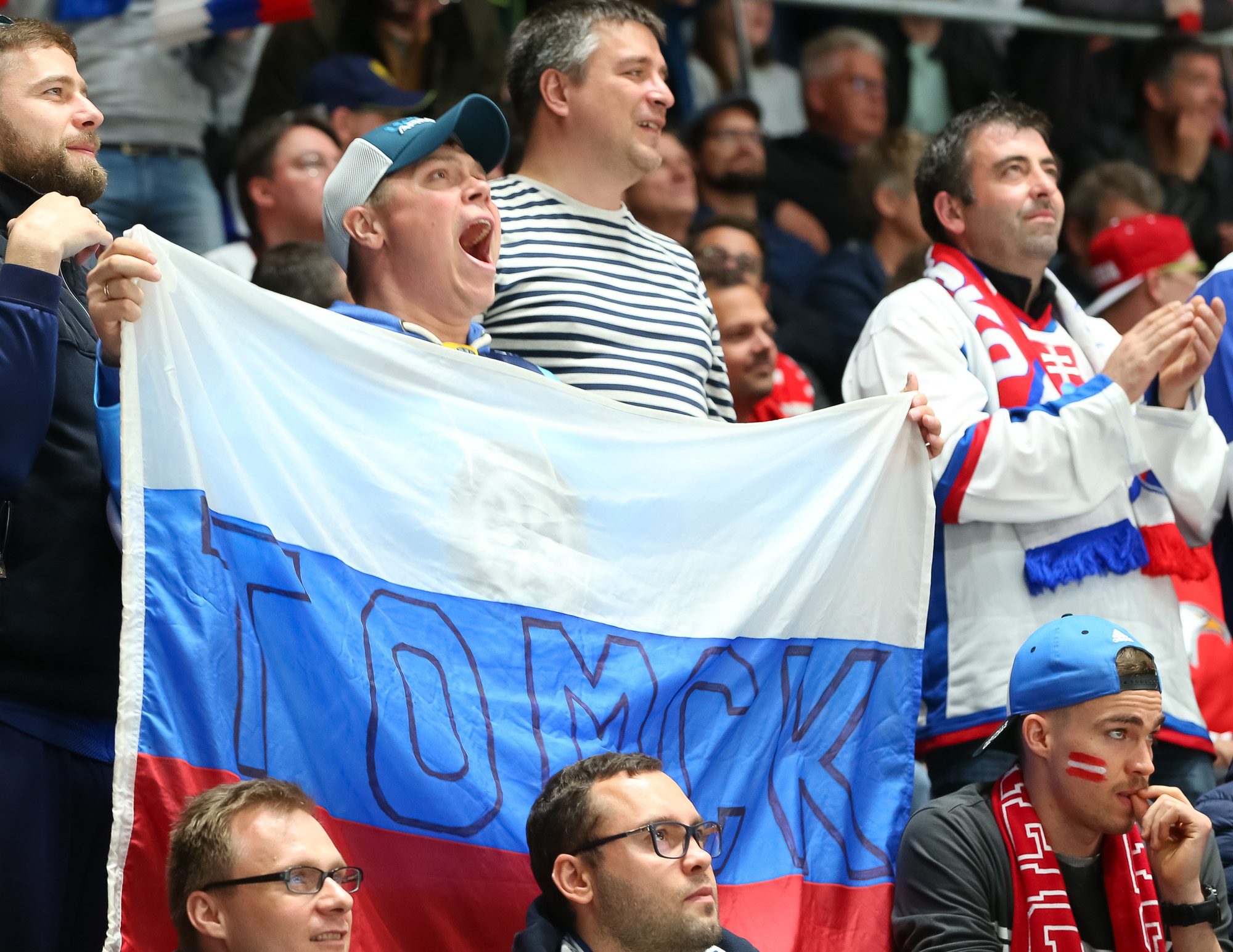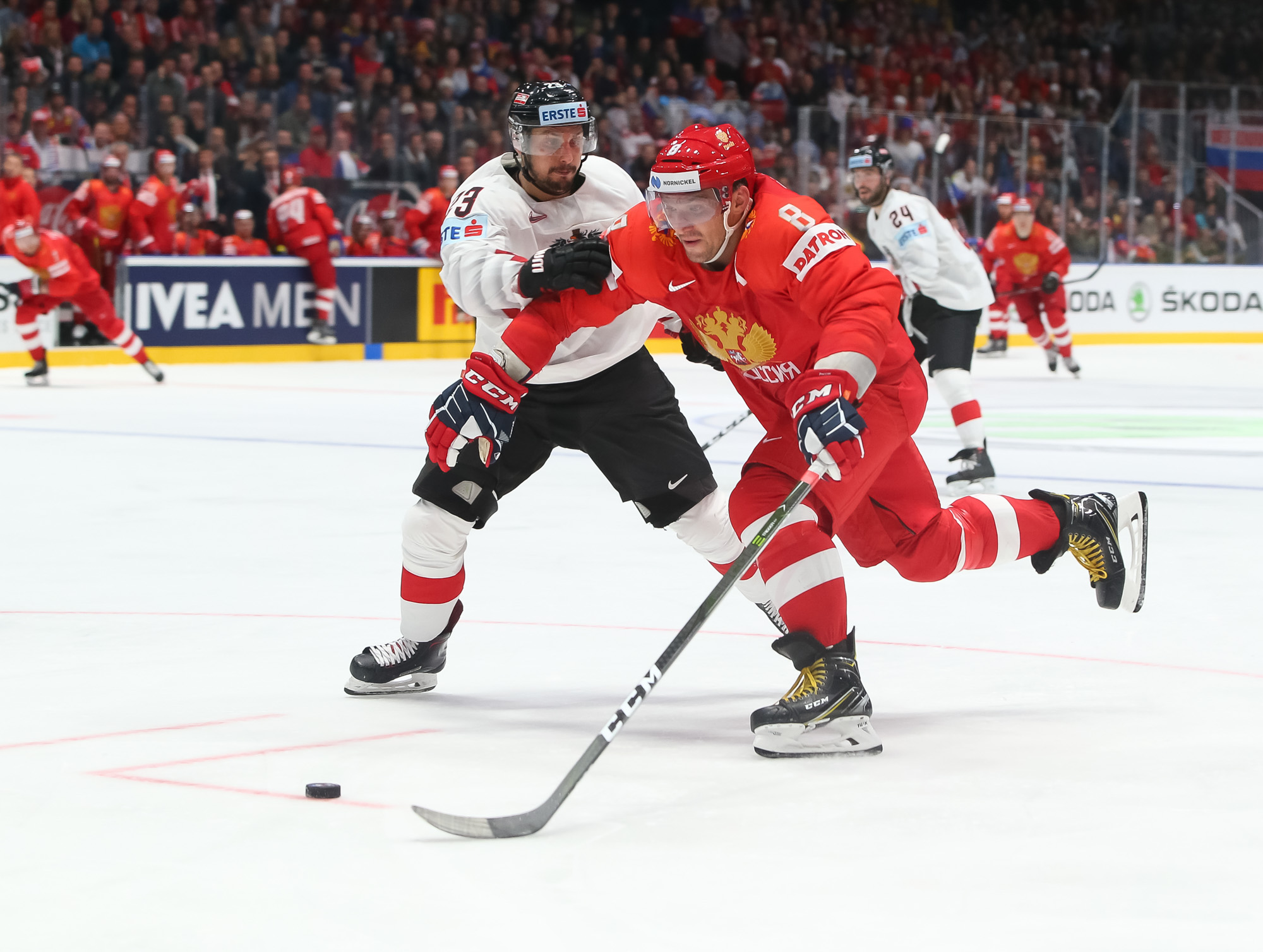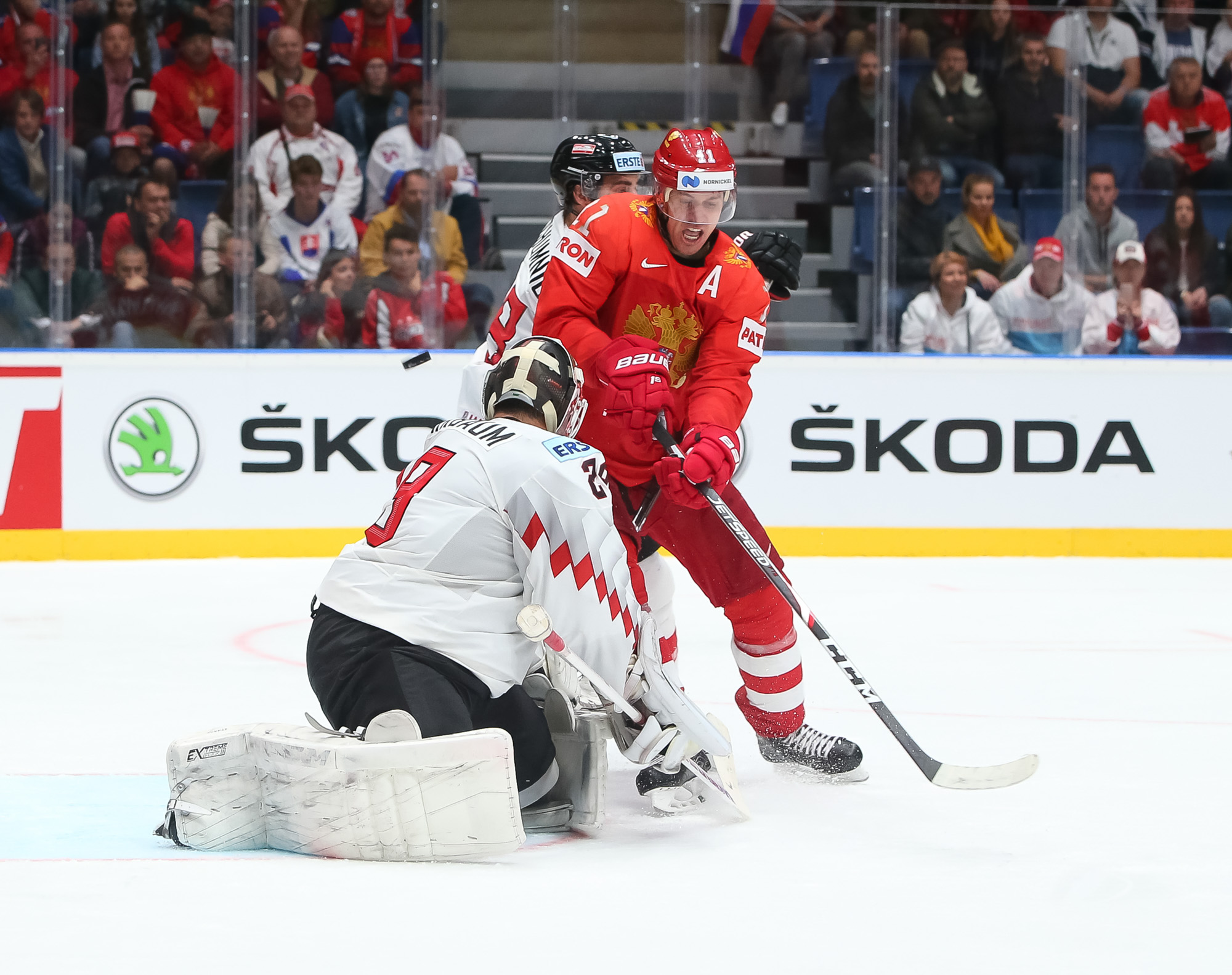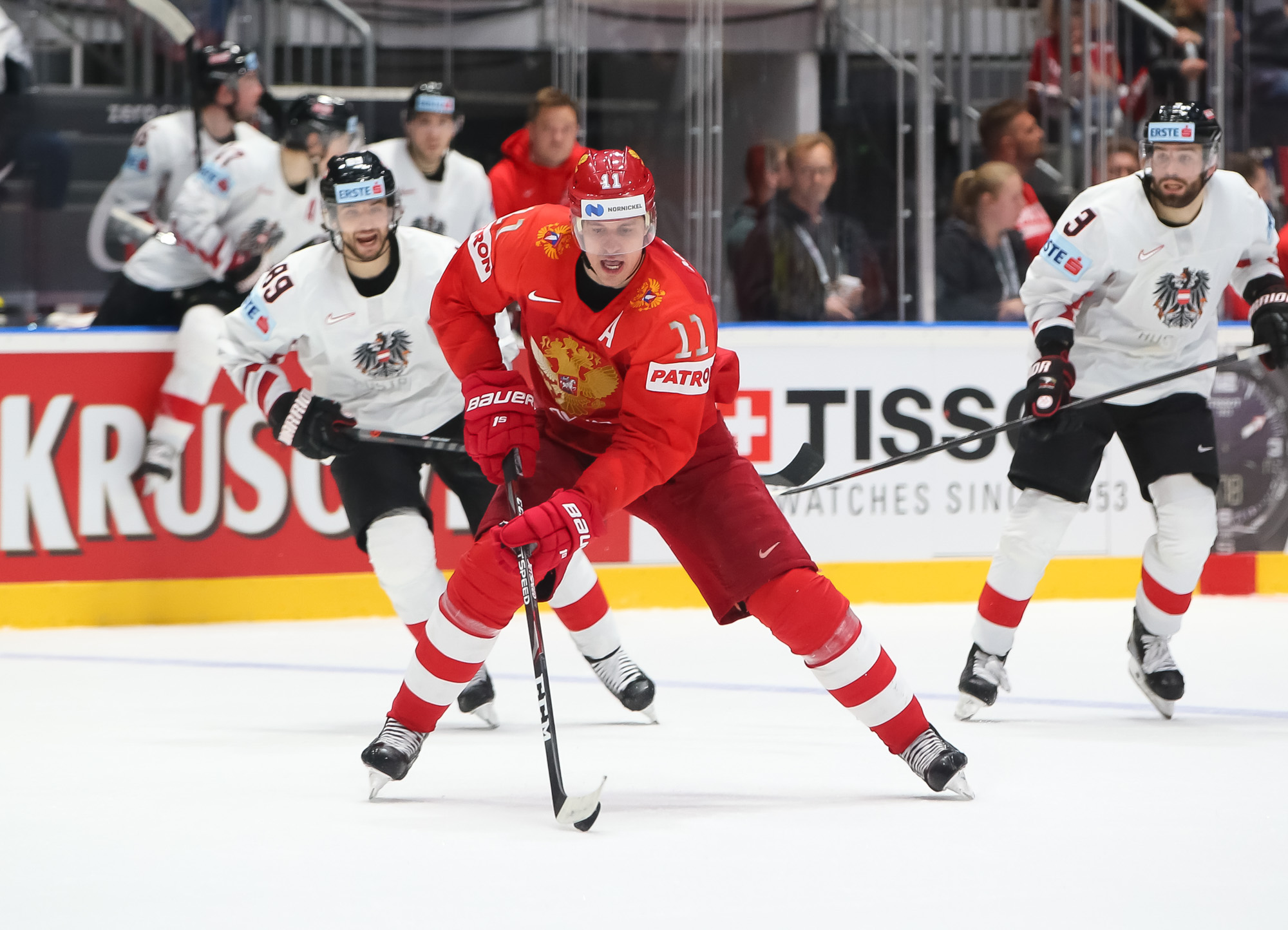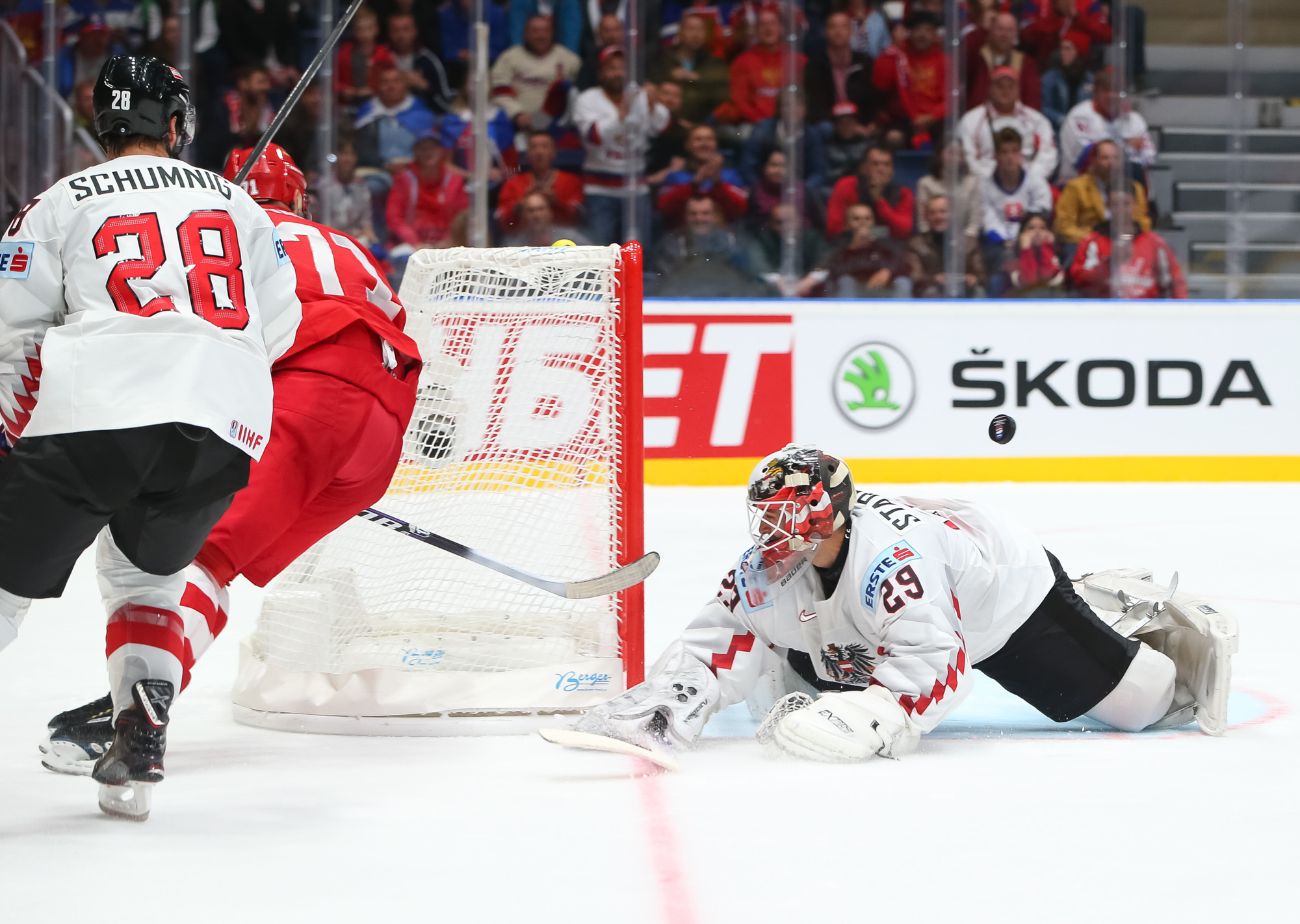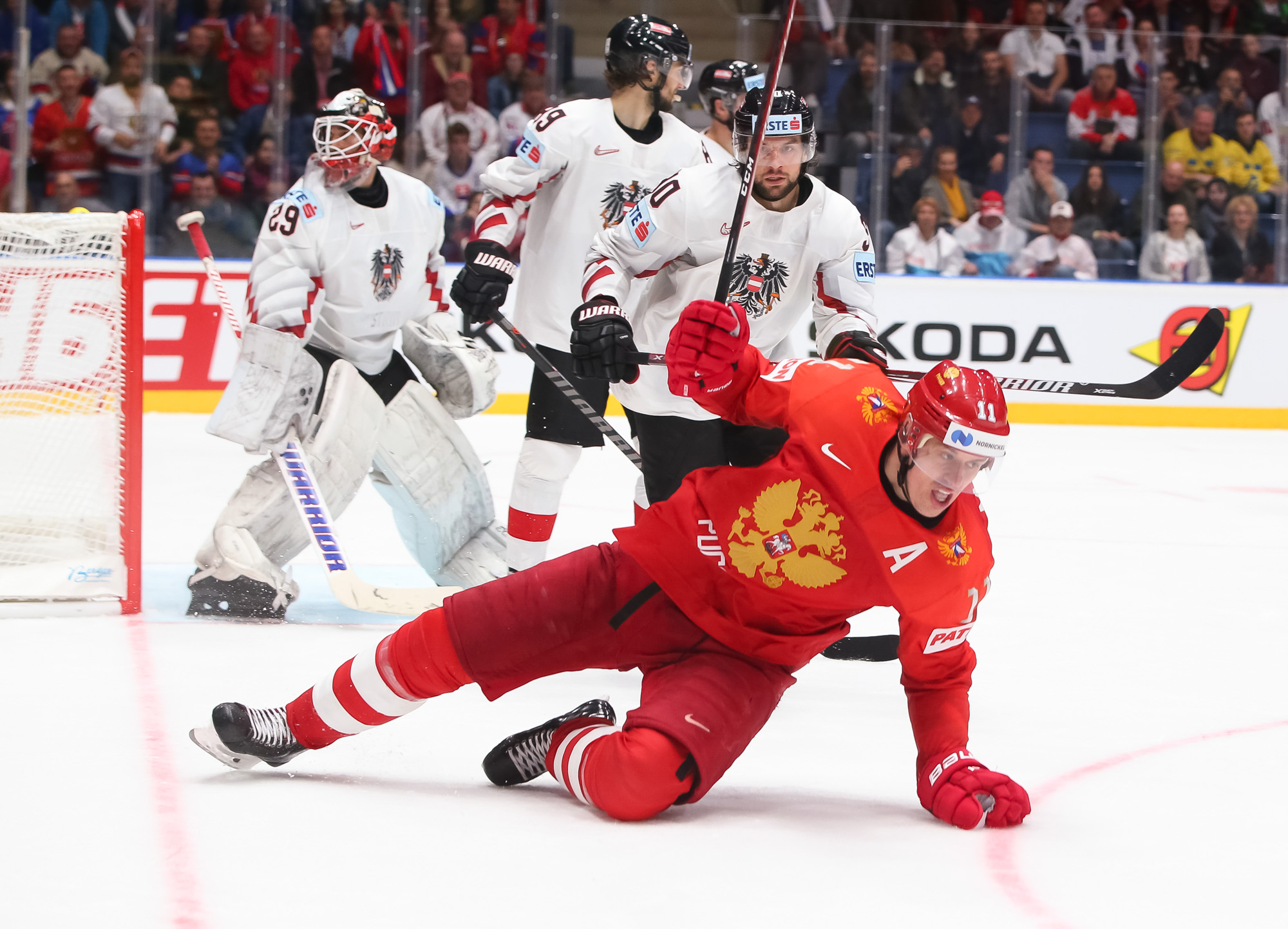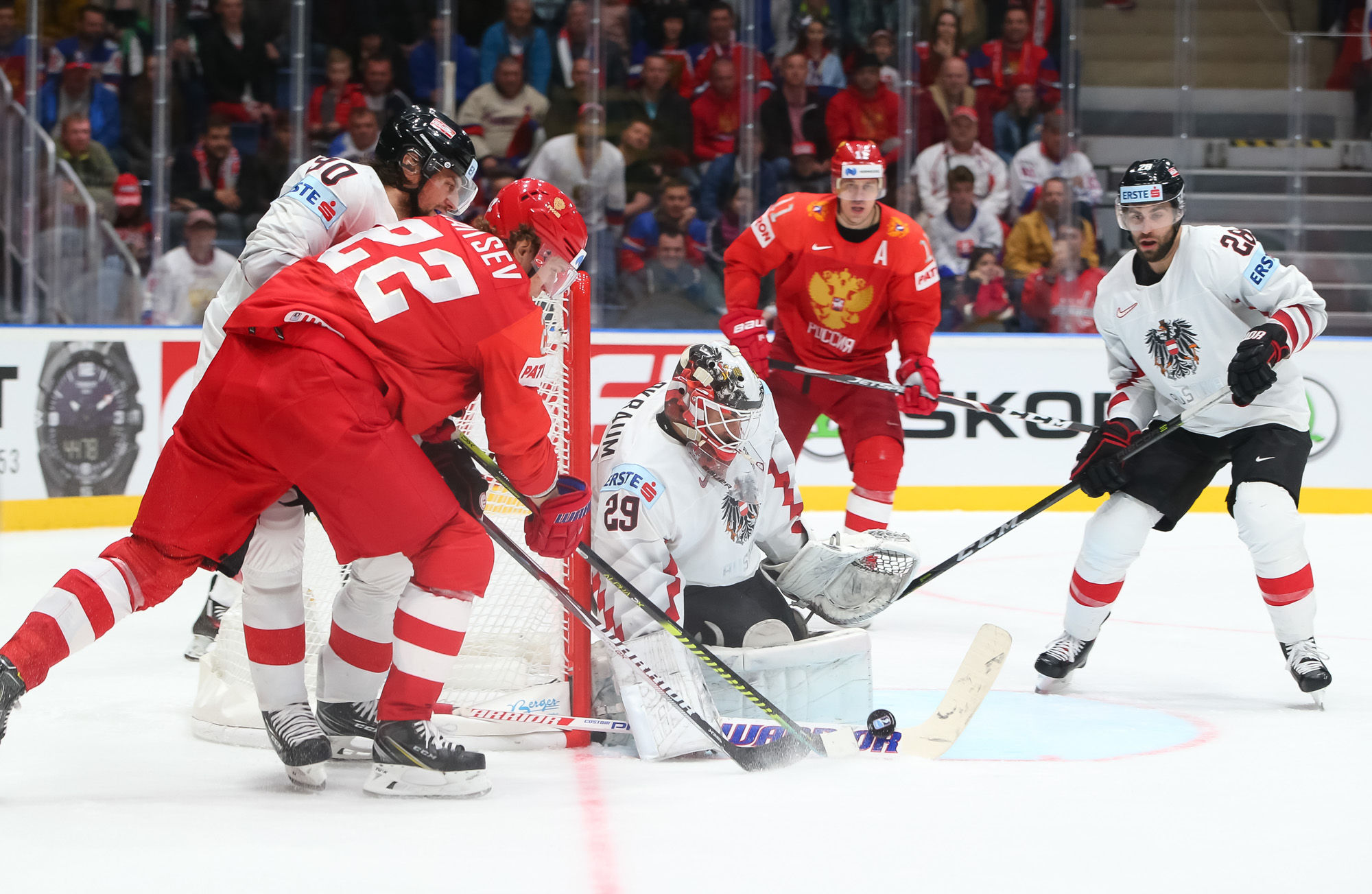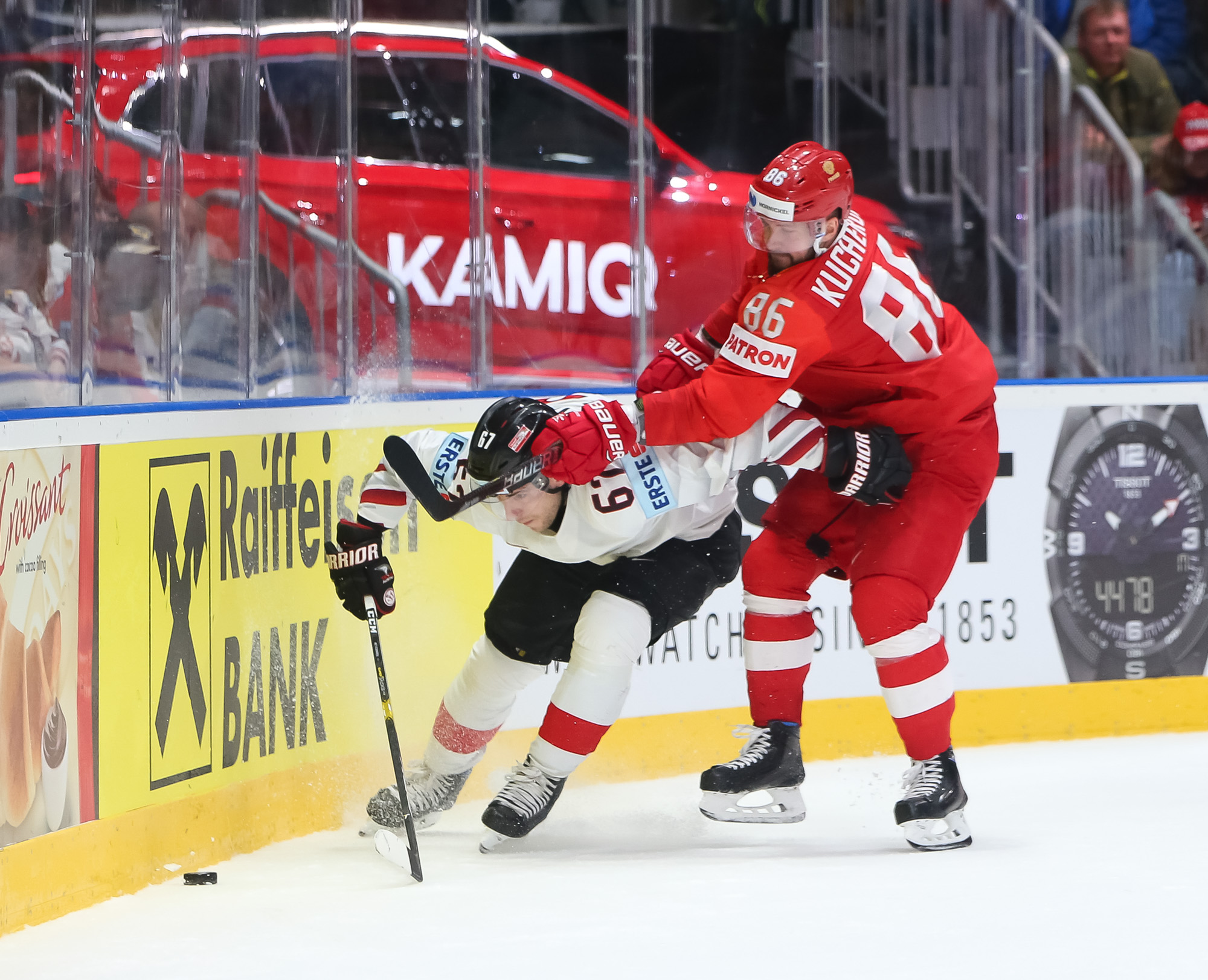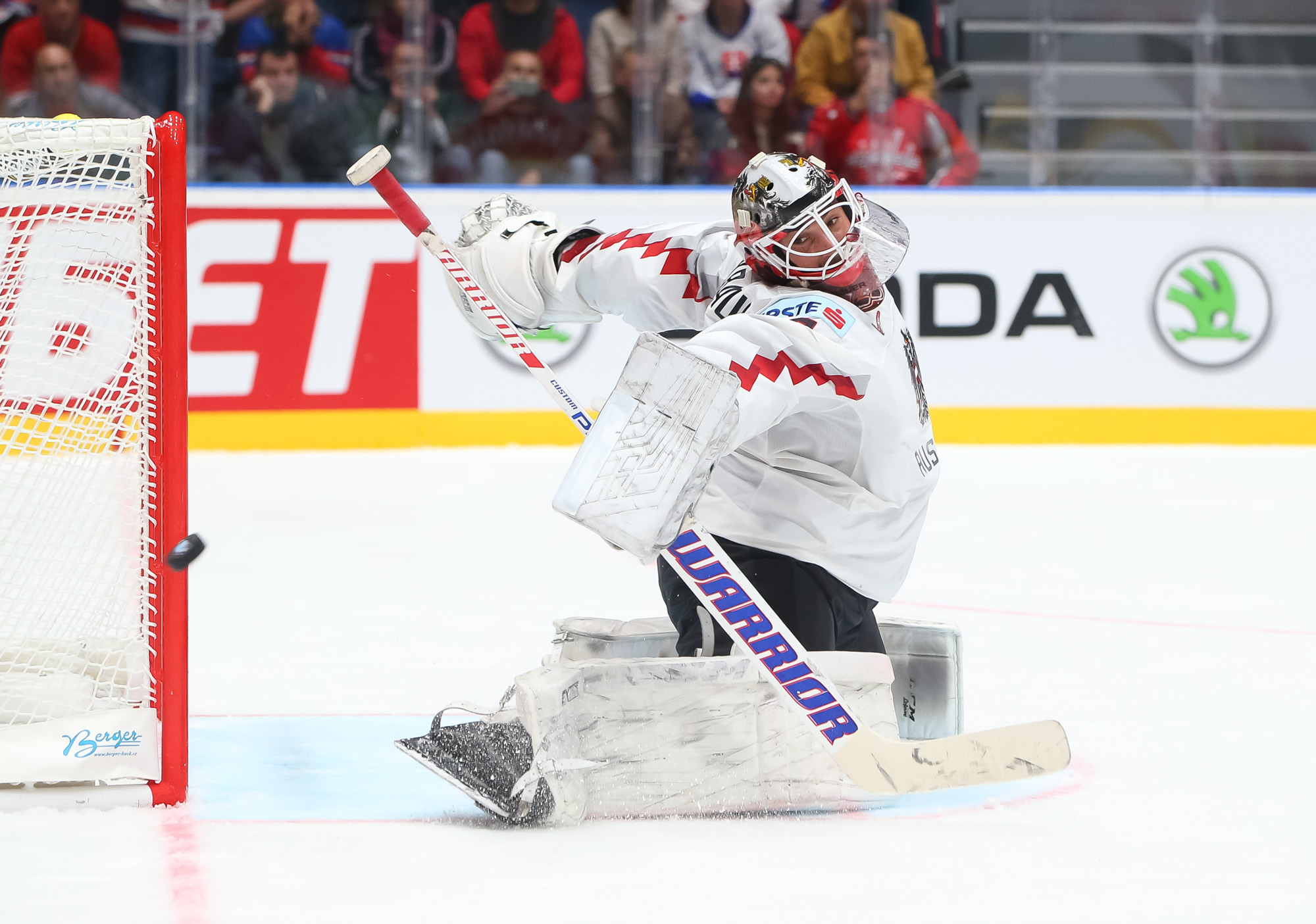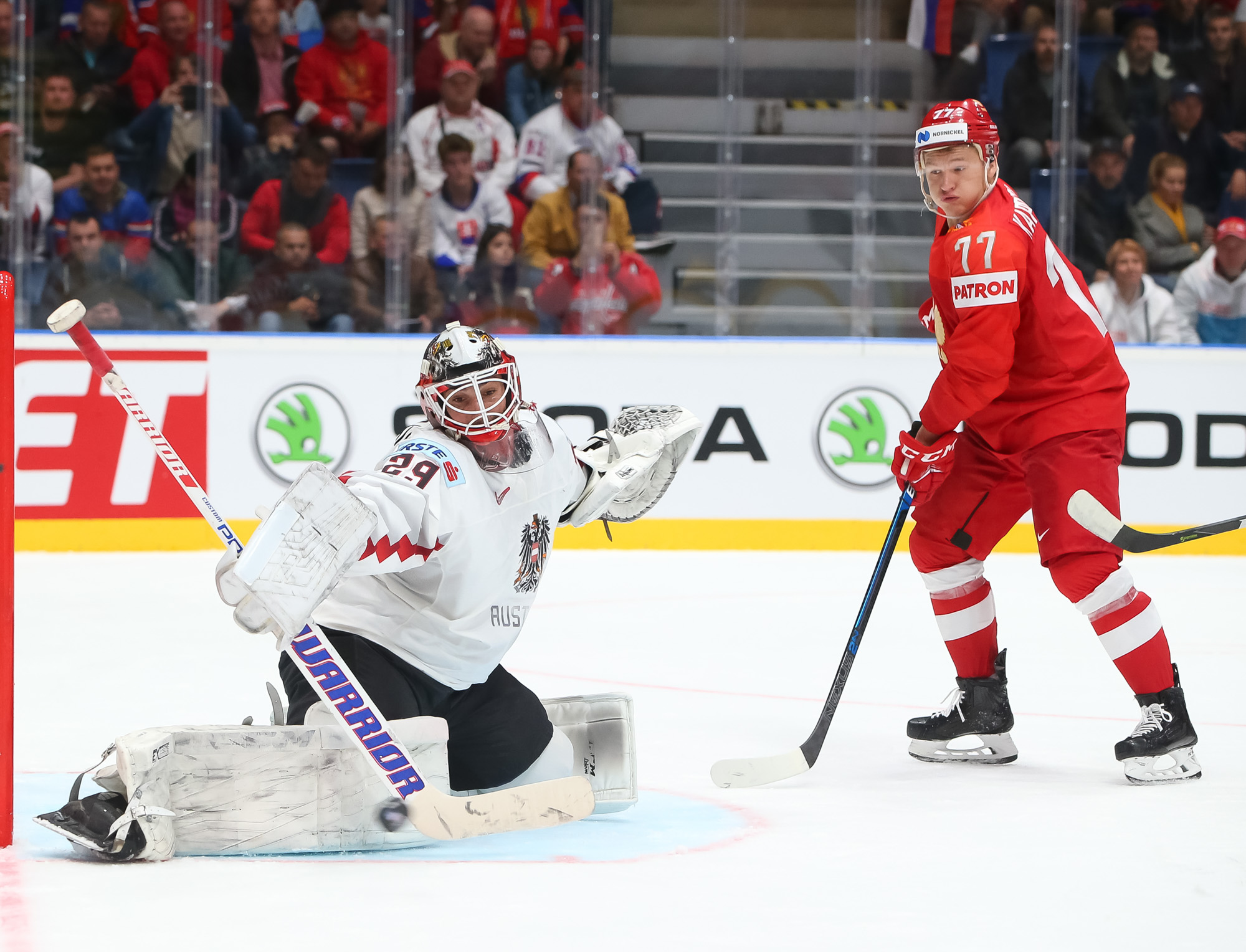Russia's Yevgeni Dadonov makes a pass over the stick of Austria's Thomas Raffl.
photo: Andre Ringuette / HHOF-IIHF Images
Yevgeni Dadonov scored twice for the second game running as Russia made it two wins from two with a 5-0 success over Austria in Bratislava’s Sunday lunchtime game. As against Norway, Dadonov kicked off the scoring with a first-period power play goal as Russia’s forwards gave the opposition a torrid time. However, while the Red Machine once again looked ominous when moving forward a more prolific team than Austria may have been able to exploit signs of weakness on defence.
After allowing four third-period goals against Latvia, Austria’s defence was set for another tough examination. The task was made harder by the absence of Patrick Peter, suspended after his ejection from Saturday’s game.
Much of the game went according to the script. Russia attacked with pace and verve; Austria concentrated on putting in the hard yards. Compact in defence and eager to put the squeeze on Russia’s fluid forward lines, the Austrians fought valiantly to keep their goal intact.
And, at times, the outsider even threatened a little more than that. The second line, led by captain Thomas Raffl, showed an impressive willingness to get forward and create what chances it could. Raffl himself forced a blocker save out of goalie Alexander Georgiev and as play continued he screened Russia’s goalie while a deflected Clemens Unterweger shot looped onto the bar and bounced to safety.
On other occasions there were signs of defensive frailty from the Russians. When Markus Schlacher set off around the back of Georgiev’s net he might have expected to encounter more resistance. Instead he was able to emerge at the goalie’s left-hand post with time to do better than squirt the puck wastefully across the front of the net without testing the World Championship debutant. Russia might reflect that more clinical opponents could easily extract greater benefit from similar openings.
Russia's captain, Ilya Kovalchuk, was certainly alert to the need for improvement. "It’s hard to say what we’re happy with from today’s game – there are plenty of things we’re not comfortable with," he said. "We allowed too many odd-man rushes – 2-on-1, 3-on-2 – and we need to be much stronger on defence. Sure, everyone wants to score lots of goals but we can’t forget about our defence."
Those Austrian chances were, of course, isolated incidents. For much of the game, Georgiev was a virtual spectator as wave after wave of Russian offence crashed onto Bernhard Starkbaum’s net. From the first minutes, Alexander Barabanov danced through on the wraparound, debutant defenceman Nikita Zadorov clipped the outside of the post and Yevgeni Dadonov fired over the top when well placed.
After allowing four third-period goals against Latvia, Austria’s defence was set for another tough examination. The task was made harder by the absence of Patrick Peter, suspended after his ejection from Saturday’s game.
Much of the game went according to the script. Russia attacked with pace and verve; Austria concentrated on putting in the hard yards. Compact in defence and eager to put the squeeze on Russia’s fluid forward lines, the Austrians fought valiantly to keep their goal intact.
And, at times, the outsider even threatened a little more than that. The second line, led by captain Thomas Raffl, showed an impressive willingness to get forward and create what chances it could. Raffl himself forced a blocker save out of goalie Alexander Georgiev and as play continued he screened Russia’s goalie while a deflected Clemens Unterweger shot looped onto the bar and bounced to safety.
On other occasions there were signs of defensive frailty from the Russians. When Markus Schlacher set off around the back of Georgiev’s net he might have expected to encounter more resistance. Instead he was able to emerge at the goalie’s left-hand post with time to do better than squirt the puck wastefully across the front of the net without testing the World Championship debutant. Russia might reflect that more clinical opponents could easily extract greater benefit from similar openings.
Russia's captain, Ilya Kovalchuk, was certainly alert to the need for improvement. "It’s hard to say what we’re happy with from today’s game – there are plenty of things we’re not comfortable with," he said. "We allowed too many odd-man rushes – 2-on-1, 3-on-2 – and we need to be much stronger on defence. Sure, everyone wants to score lots of goals but we can’t forget about our defence."
Those Austrian chances were, of course, isolated incidents. For much of the game, Georgiev was a virtual spectator as wave after wave of Russian offence crashed onto Bernhard Starkbaum’s net. From the first minutes, Alexander Barabanov danced through on the wraparound, debutant defenceman Nikita Zadorov clipped the outside of the post and Yevgeni Dadonov fired over the top when well placed.
Russia vs. Austria - 2019 IIHF Ice Hockey World Championship
RUS vs. AUT
The deadlock was finally broken in the 13th minute as Russia’s power play struck once again. Mikhail Sergachyov kept the puck in the Austrian zone and Nikita Kucherov and Nikita Gusev swung passes from side to side, pulling the undermanned defence out of position before Dadonov fired home his third power play goal in two games. The Russian PP improved to four from five after its impressive start against Norway.
"We started slowly, but we converted our power play well and after that I felt we more or less controlled the game," Kovalchuk added.
Despite Kovalchuk's confident assessment, Russia did struggle for a time to build on that advantage. The early intensity began to fade and Austria visibly grew in confidence, finding it progressively easier to slow those red raids. For much of the second period Russia huffed and puffed, managing just five shots on goal in 14 minutes. In the midst of this, even that deadly power play went astray: when Schlacher sat for interference, Russia twice allowed Austrian breakaways and finished up with Kucherov heading to the sidelines.
Debutant Zadorov admitted that Russia made harder work of this game than might have been expected. "We should have got this done today," he said. "We're a way higher-class team than Austria. But I think we're still finding a bit of chemistry. Lots of guys came from overseas, they're used to a smaller rink, a little bit different style of game. So we're still trying to find our game and maybe fix a few things defensively with our puck management."
But this team has an extra gear and, when engaged, it plundered two goals in 36 seconds to crush any hopes of an Austrian upset. First came Kucherov, showing fantastic movement as he burst into enemy territory and played an instinctive drop pass for Gusev before circling around to shoot home his colleague’s return feed. Then it was Ivan Telegin, added to the roster the day before, who added a third. The CSKA centre was left in solitary splendour in front of Starkbaum’s net to bundle in Ilya Kovalchuk’s pass off the boards.
"It was nice to keep it tight in the beginning," said Austria's Michael Raffl. "That makes it exciting against these guys. But once they got it going and went up 3-0, honestly, we knew we were done.
"I think we showed a lot of character. Guys were still blocking shots and everything right to the end. It was as hard as expected but there are also some positives to take away."
The previous day Austria’s hard-working game ran out of steam in the final stanza against Latvia, where an early goal from Lauris Darzins ushered in a tough 20 minutes for Roger Bader’s men. Today there was a repeat: just 15 seconds into the third period Dadonov got his second of the game, cashing in after an Austrian defenceman failed to cut out a Sergachyov pass. Kovalchuk soon added a fifth, diverting Dmitri’s Orlov’s blast beyond Starkbaum for his 35th goal at an IIHF Ice Hockey World Championship.
The closing stages of the Norway game saw Russia unable to close out a shut-out for Andrei Vasilevski. Today, with Georgiev making his World Championship debut, the team managed to hold Austria at bay and secure a shut-out for the newcomer. Bulgarian-born Georgiev moved to Moscow as a child and learned his hockey with the Pingviny club in the Russian capital. A roundabout journey via the Finnish Liiga took the 23-year-old to the New York Rangers, where he is currently working to establish himself as #1 pick. This championship represents a first senior call-up for the 2016 World Juniors silver medallist.
"It was nice to start with a shut-out," he said. "As a team we always need to defend right to the end. After what happened at the end of [the Norway] game I was pleased that we all helped out to get that shutout."
"We started slowly, but we converted our power play well and after that I felt we more or less controlled the game," Kovalchuk added.
Despite Kovalchuk's confident assessment, Russia did struggle for a time to build on that advantage. The early intensity began to fade and Austria visibly grew in confidence, finding it progressively easier to slow those red raids. For much of the second period Russia huffed and puffed, managing just five shots on goal in 14 minutes. In the midst of this, even that deadly power play went astray: when Schlacher sat for interference, Russia twice allowed Austrian breakaways and finished up with Kucherov heading to the sidelines.
Debutant Zadorov admitted that Russia made harder work of this game than might have been expected. "We should have got this done today," he said. "We're a way higher-class team than Austria. But I think we're still finding a bit of chemistry. Lots of guys came from overseas, they're used to a smaller rink, a little bit different style of game. So we're still trying to find our game and maybe fix a few things defensively with our puck management."
But this team has an extra gear and, when engaged, it plundered two goals in 36 seconds to crush any hopes of an Austrian upset. First came Kucherov, showing fantastic movement as he burst into enemy territory and played an instinctive drop pass for Gusev before circling around to shoot home his colleague’s return feed. Then it was Ivan Telegin, added to the roster the day before, who added a third. The CSKA centre was left in solitary splendour in front of Starkbaum’s net to bundle in Ilya Kovalchuk’s pass off the boards.
"It was nice to keep it tight in the beginning," said Austria's Michael Raffl. "That makes it exciting against these guys. But once they got it going and went up 3-0, honestly, we knew we were done.
"I think we showed a lot of character. Guys were still blocking shots and everything right to the end. It was as hard as expected but there are also some positives to take away."
The previous day Austria’s hard-working game ran out of steam in the final stanza against Latvia, where an early goal from Lauris Darzins ushered in a tough 20 minutes for Roger Bader’s men. Today there was a repeat: just 15 seconds into the third period Dadonov got his second of the game, cashing in after an Austrian defenceman failed to cut out a Sergachyov pass. Kovalchuk soon added a fifth, diverting Dmitri’s Orlov’s blast beyond Starkbaum for his 35th goal at an IIHF Ice Hockey World Championship.
The closing stages of the Norway game saw Russia unable to close out a shut-out for Andrei Vasilevski. Today, with Georgiev making his World Championship debut, the team managed to hold Austria at bay and secure a shut-out for the newcomer. Bulgarian-born Georgiev moved to Moscow as a child and learned his hockey with the Pingviny club in the Russian capital. A roundabout journey via the Finnish Liiga took the 23-year-old to the New York Rangers, where he is currently working to establish himself as #1 pick. This championship represents a first senior call-up for the 2016 World Juniors silver medallist.
"It was nice to start with a shut-out," he said. "As a team we always need to defend right to the end. After what happened at the end of [the Norway] game I was pleased that we all helped out to get that shutout."
Russia vs. Austria - 2019 IIHF Ice Hockey World Championship
OF
